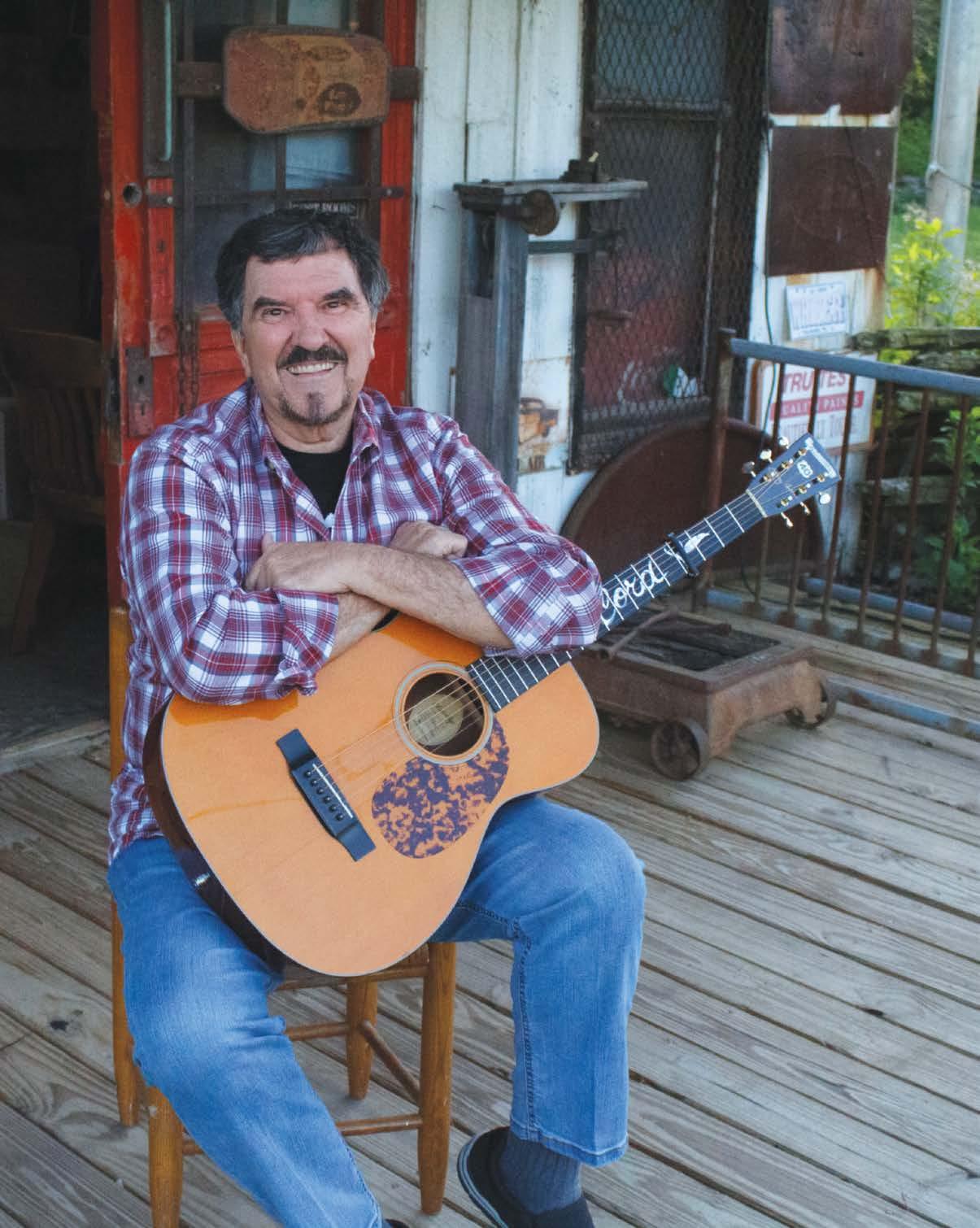

LARRY CORDLE Bluegrass REVIEWS: MUSICIANS TRIBUTE TO CHET ATKINS • JOHN COWAN MEMOIR OFFICIAL JOURNAL OF AFM LOCAL 257 APRIL – JUNE 2024 Bluegrass BORN LARRY CORDLE MEMBERSHIP MEETING MAY 28 5:30 P.M. ZOOM AND IN PERSON MEMBERSHIP MEETING


7
ANNOUNCEMENTS Details on the upcoming member meeting Tuesday, May 28, on Zoom, and also in person at Local 257. The meeting will include proposals to raise the demo and limited pressing scales, and a proposal for a new multi-employer demo session option.
STATE OF THE LOCAL Dave Pomeroy on strength in solidarity, AI, protecting your intellectual property, and more.
BETWEEN THE NOTES Secretary-Treasurer Will Barrow talks about just a few of the many perks from which Local 257 members can benefit.
NEWS Updates on parking discounts, traveling with your instrument, and more. 10 HEARD ON THE GRAPEVINE
The comings and goings of Local 257 members.
12 GALLERY We recognize member milestones as well as other events and honors.
14
COVER STORY: LARRY CORDLE Warren Denney talks to songwriter and bluegrass artist Larry Cordle about the winding road that led the plain-spoken Kentuckian to music, and continues to bring him both critical acclaim and a faithful throng of fans — in Music City or on the road.
20 REVIEWS Iconic guitarist Chet Atkins continues to inspire, and will always be part of any player’s education. A new release of amazing tracks spearheaded and produced by Carl Jackson, features some of the best guitarists around. Our review of We Still Can’t Say Goodbye gives all the details. Plus, we review Hold to a Dream, bassist John Cowan’s fascinating collection of interviews he conducted over the years with high-profile musicians. It’s safe to say you haven’t heard some of these stories before. 24 SYMPHONY NOTES Symphony steward Mindy Whitley discusses NSO negotiations, which began in May.
25 JAZZ & BLUES Austin Bealmear offers an update on local jazz and blues.
26 FINAL NOTES We bid farewell to Buck Trent, Michael Henderson, Mervin Shiner, Sylvia Samis, Anne Christeson, Shoji Tabuchi, and Willis Spears.
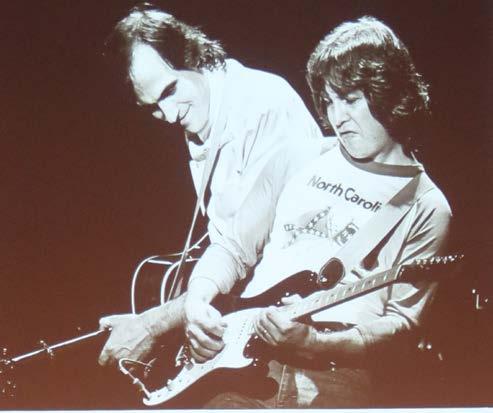


ON THE GRAPEVINE

DO
APRIL – JUNE 2024 3 Official Journal of the Nashville Musicians Association, AFM Local 257 | APRIL – JUNE 2024 4
6
8
33
STATUS 34
NOT
LIST CONTENTS
MEMBER
WORK FOR
Cover Photo: LuAnn Smith 14
12
LARRY CORDLE
GALLERY
10
DAN DUGMORE
JIMMY CHURCH
HEARD

OFFICIAL QUARTERLY JOURNAL OF THE NASHVILLE MUSICIANS ASSOCIATION
AFM LOCAL 257
PUBLISHER EDITOR
MANAGING EDITOR
ASSISTANT EDITOR
CONTRIBUTING WRITERS
CONTRIBUTING PHOTOGRAPHERS
ART DIRECTION
WEB ADMINISTRATOR AD SALES
LOCAL 257 OFFICERS PRESIDENT
SECRETARY-TREASURER
EXECUTIVE BOARD
Dave Pomeroy
Will Barrow
Kathy Osborne
Leslie Barr
Austin Bealmear
Warren Denney
Melinda Whitley
Roy Montana
Kathy Osborne
Dave Pomeroy
Mickey Dobo
Donn Jones
Dave Pomeroy
Lisa Dunn Design
Kathy Osborne
Leslie Barr
615-244-9514
Dave Pomeroy
Will Barrow
Jerry Kimbrough
Alison Prestwood
Biff Watson
Laura Ross
Rich Eckhardt
Tom Wild
Jonathan Yudkin
EXECUTIVE BOARD ALTERNATES
HEARING BOARD
Paul Ossola
Casey Brefka
Michele Voan Capps
Tiger Fitzhugh
Teresa Hargrove
Kent Goodson
Sarah Martin McConnell
Dave Moody
Ellen Angelico
TRUSTEES
SERGEANT AT ARMS
NASHVILLE SYMPHONY STEWARD
OFFICE MANAGER
ELECTRONIC MEDIA
SERVICES DIRECTOR
RECORDING/ELECTRONIC MEDIA
Bruce Radek
Biff Watson
Steve Tveit
Melinda Whitley
Savannah Ritchie
Billy Lynn
Paige Conners
William Sansbury
Cassandra Tormes
Zoe Willott
DIRECTOR, LIVE/TOURING DEPT. AND MPTF COORDINATOR
MEMBERSHIP
Leslie Barr
Michael Minton
Alona Meek
Brittany Evers
@2024 Nashville Musicians Association
P.O. Box 120399, Nashville TN 37212 All rights reserved. nashvillemusicians.org
NASHVILLE MUSICIAN
THE NEXT LOCAL 257 GENERAL MEMBERSHIP MEETING IS SCHEDULED FOR TUESDAY, MAY 28, 2024, AT 5:30 P.M. ON ZOOM AND AT THE LOCAL.
Doors will open at 5 p.m. and the meeting will start promptly at 5:30 p.m. On the agenda are two proposed bylaw amendments (details below), and proposals for changes to the demo and limited pressing scales (details on facing page). Please make plans to attend this important meeting and get involved in the business of your local.
BYLAW AMENDMENT PROPOSALS FOR MAY 28 MEETING
Proposal format: old language shown as strikethrough, new language underlined
Article I, Section 45 - Vic Willis Emergency Relief Fund Committee
Section 45. The Vic Willis Emergency Relief Fund Committee shall consist of seven (7) five (5) members, including appointed by the Secretary/Treasurer and President, and five (5) three (3) other members to be appointed by the Secretary/Treasurer and President, subject to Executive Board approval, for a term of one (1) year. Of the five (5) members to be appointed by the Secretary/Treasurer and President, three (3) will be voting members, and two (2) shall be named alternate members. One or both of the alternate members are permitted to vote in the absence of any of the three voting members, at the discretion of the chairperson. The chairperson of such committee shall be elected from its members. The five (5) Vic Willis Emergency Relief Fund Committee members appointed by the Secretary/Treasurer shall be exempt from annual dues and funeral benefit payments during their term of office.
Executive Board Recommendation: Favorable
Article XII, Sections 7 and 8 - Funeral
Benefit Fund
Section 7. The minimum Funeral Benefit Fund fee in any calendar year shall be set by the Fiduciary Trustees of the Fund, based on the total payout in the previous full calendar year divided by the number of members in the 4th quarter of the current year. If in any calendar year the local Fiduciary Trustees shall determine based upon actuarial and other considerations that a change in Funeral Benefit Fund fee should be made, the amount shall be determined by the Fiduciary Trustees, in their discretion and in compliance with the Employee Retirement Income Security Act of 1974. with the approval of the Local 257 Executive Board.
Delete the following Article XII, Section 8, in its entirety
Section 8. If during any calendar year Funeral Benefit Fund payments exceed $100,000, the local Fiduciary Trustees shall levy an additional Funeral Benefit Fund assessment upon each member, a minimum amount of fifty cents ($.50) for each additional $1,000 in benefits paid. The exact amount of the assessment will be determined annually by the fiduciaries of the Funeral Benefit Fund, with the approval of the Local 257 Executive Board.
Executive Board Recommendation: Favorable

DO WE HAVE YOUR CURRENT EMAIL ADDRESS?
Local 257 sends important advisories to members by email, including updates on our annual NAMM pass giveaway, and invitations to Local 257 events. Don't be left out of the loop! Notify the front desk of any changes to your contact information, including phone number, address and beneficiary. Call 615-244-9514 to make sure we have your correct information.
4 THE
ANNOUNCEMENTS
New Proposed Demo and Limited Pressing Rates – Mul8ple Employer Demos
Local 257 Demo and Limited Pressing session rates have not been increased in more than a decade. These Local 257 recording rates can be unilaterally changed by the local, but in the interest of full transparency, will be presented to members for their feedback and approval at the May 28 member meeting. The proposed changes will go into effect July 1, 2024.
Reminder: All pension contributions are based on 14.09 percent of scale wages. The $30 Health & Welfare payments are paid on top of scale wages and are not part of the pension calculation. Multiple sessions for one employer have a $30 H&W payment for the first session and $22 for each subsequent session on the same day, with the exception of the multiple employer demo scenarios below, in which, for simplicity, the H&W remains at $30 for multiple sessions in one day.
DEMO
Current (3 HR)
Leader: $312.00 + $30 (H&W) = $342
Sideman: $156.00 + $30 = $186
Current (2 HR)
Leader: $208.00 + $30 (H&W) = $238
Sideman: $104.00 + $30 = $186
30 minutes overFme 150% $78 ldr/39 side
Current (1 HR – Single Musician)
Leader: $104 + $30 (H&W) = $342
NEW RATES (9% raise) Pension
$340 + $30 = $370 $47.91
$170 + $30 = $200 $23.95
NEW RATES (5.8% raise) Pension
$220 + $30 = $250 $31
$110 + $30 = $140 $15.50
$82.50 ldr/41.25 side $11.62/$5.81
NEW RATES (5.8% raise) Pension
$110 + $30 (H&W) $15.50 No OverFme Allowed
LIMITED PRESSING
NEW RATES (10.2% raise)
Current (3 HR) Pension
Leader: $393 + $30 (H&W) = $423
Sideman: $196.50 + $30 = $226.50
Current (2 HR)
Leader: $262 + $30 (H&W) = $292
Sideman: $131 + $30 = $161
MULTIPLE EMPLOYER 3 HOUR DEMOS
Two Employers - 1.5 HR x 2 - cost per employer
Leader: $185 + $15 (H&W) = $200
Sideman: $92.50 + $15 = $107.50
Three Employers - 1 HR x 3 - cost per employer
Leader: $130 + $10 (H&W) = $140
Sideman: $65 + $10 = $75
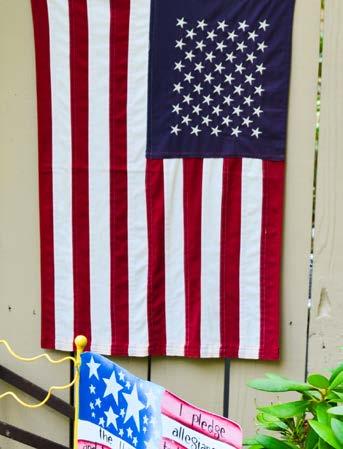
HOLIDAYS
Monday, May 27 — Memorial Day
Wednesday, June 19 — Juneteenth
Thursday and Friday, July 4-5 — Independence Day
$433 + $30 = $463 $61.01
$216.50 + $30 = $246.50 $30.50
(9.9% raise) Pension
$288 + $30 = $318 $40.57
$144 + $30 = $174 $20.29
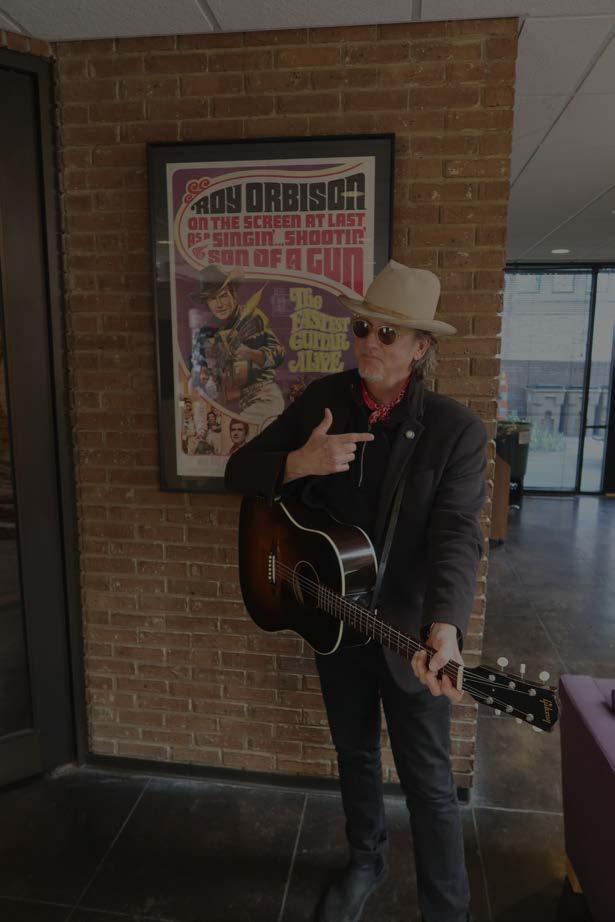
Sideman: $195 + $30 = $225 $27.48

ANNOUNCEMENTS Local 257 General Membership Meeting Tuesday, May 28, 2024 5:30 p.m. on Zoom and at Local 257
PROPS TO YOU TNM
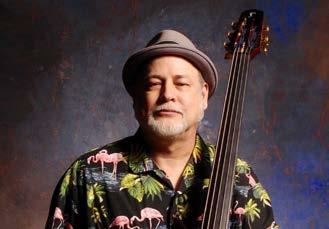 BY DAVE POMEROY
BY DAVE POMEROY
There is little doubt that these are challenging and complex times in many ways — all around the world. Musicians have always had to struggle with the ever-changing realities of making a decent living doing what we love to do. Music can be a powerful force in the world, but making the economics of it all work can be a real challenge in a constantly evolving entertainment industry.
You could have taken on the music business by yourself, but instead you made the choice to be a member of the AFM and Local 257 team, which means that you are not alone. We have been helping musicians for more than 120 years and have your back. Local 257 has played a major role in making Nashville Music City. I am sure that almost every one of you know people who should be AFM 257 members but are not. Please help us help each other by reaching out to them and inviting them to be part of the team that is already working on their behalf. The more of us there are, the more power we have to make things better.
Technology vs musicians
Technology has given us many tools, but has also presented serious challenges over the years. Going back more than a century, there have always been concerns about musicians being replaced by technology. The latest and most powerful version of this threat is the development of Artificial Intelligence (AI). Our new AFM contract with the film and tv industry contains groundbreaking language regarding AI, ensuring that musicians have rights of consent, credit, and compensation for the use of their work and image. If you’ve wondered where your work dues go, here’s one place: They make negotiations with employers possible — and successful. In AI news closer to home, earlier this year Tennessee was the first state to pass
Strength in solidarity
legislation intended to combat the potential use of AI in music, known as the ELVIS Act. The legislation language is not perfect, but it is a start. I have been in contact with one of the bill’s cosponsors, who has agreed to get together to work on amending the language in January to more specifically protect musicians. If I was working alone, I could not have secured that promise from him. Our strength in numbers give us solidarity and power we would not have as individuals, even in a politically divided state such as Tennessee.
Doing the right thing
In our longtime Music City business model, there is always the option to do things in a fair and ethical fashion – or not. We have a very high level of voluntary union compliance among our employers, which is higher than anywhere in the world. It is not a secret that some people and companies will use Tennessee’s right-to-work (for less) laws to avoid hiring musicians under AFM contracts, and thereby take away any and all of their intellectual property rights, including any hope of residuals or New Use payments. This greedy minority would rather take advantage of the musicians they claim to respect than to do the right thing — treat musicians with respect. It’s The Nashville Way. That is how we got here, and the AFM 257 doors are always open to anyone who wants to learn how to do things right.
We have many examples of how the union benefits its members and beneficiaries by getting them paid for the use of their intellectual property, sometimes long after the work was done. The nonmembers who work under our contracts get those same benefits, without joining the entity that makes the payments they are receiving possible. Some of them refuse to pay the nonmember service fee. If everyone did that, we would not exist. Thankfully, those
folks are in the minority. Our track record speaks for itself – we are the third largest AFM Local in the U.S. and our musicians got paid nearly $12 million in 2023. We have been able to get New Use and residuals payments for recordings going back to the 1950s – but only if they were done on the card. Mazda, Michelob Ultra, The PGA, and the movie Fast and Furious have all paid residuals on recordings made more than 50 years ago. That’s the power of the AFM paper trail, and makes the front-end work of getting the paperwork taken care of more than worth the time and effort.
Union strong
For some members, the rehearsal hall is their main reason for joining, for others it’s the Blue Cross Blue Shield exclusive health insurance plan and Union Plus benefits, and for some it’s the downtown parking discounts. Our Wednesday workshops and other events help connect and benefit our community, as does the weekly AA meeting at 6 p.m. We help connect our members with work through our booking agency and Music Performance Trust Fund shows. For those recording at home, the Single Song Overdub Scale is easy to use and allows you to charge clients by the song with a simple online agreement, and make your own pension contribution on behalf of employer. The Touring Pension Agreement allows touring musicians to receive pension contributions on a per-gig basis.
Together, we can make a difference in our world much more effectively than we can do when acting alone. We are more connected to the Nashville creative community than ever, and respect for unions is growing exponentially all over the U.S. I am proud to represent all of you, and will continue to do all I can to promote respect for musicians, and the work we do.
6 THE NASHVILLE MUSICIAN
STATE OF THE LOCAL
TNM
Our union is expanding
Happy spring, everyone! One of our missions here at the union is to work to expand not only the quantity and diversity of our membership, but also the services, programs and benefits to our members, and what we give to the community at large. Here are some of the great things we are initiating and making happen.
Membership with benefits
Our fine AFM 257 rehearsal hall has been very busy of late, with the sounds of jazz, rock & roll, bluegrass, R & B, Brazilian music, blues, and other genres emanating into my workspace here, which is very cool! In our series of monthly events at the hall, we will be adding a Jazz Night the first Wednesday of each month.
In the 257, we are fortunate to have a number of amazing jazz artists, in a lot of different styles, and they will be doing their thing at the union. Like the World Music Night (second Wednesday of each month), the format of these events will be up to the presenter. For some Jazz Nights, the presenter will do more of a class, with a strong educational focus, and at others hosts will give more of a performance, and offer discussion. Performers will articulate how they developed their particular approach to groove, interplay and improvisation, and what inspires them. There will be traditional and contemporary jazz, original tunes, standards, free jazz, vocalists, big bands and much more. The first Jazz Night at the rehearsal hall will be June 12, from 7 to 9 p.m. These events are free and open to the public, and kids and families are welcome.
We are now also offering appointments with audiologist Jason Baker in the rehearsal hall, at a discounted rate for union members. Our hearing is our livelihood, and many of us are overdue to have ours evaluated. We also need to be aware of how best to protect our hearing, and what is available in the way of hearing reinforcement for those of us who already
“We are offering appointments with audiologist Jason Baker in the rehearsal hall, at a discounted rate for union members. Our hearing is our livelihood, and many of us are overdue to have ours evaluated.”
have some hearing loss. We will send out an email to inform members when Baker is booking appointments at the hall. He is also available to be seen at his office. For more info on these audiology services, email me at willb@nashvillemusicians.org.
13 garages now included in member parking discounts
We have expanded the number of downtown parking garages that offer lower rates to our members. Local 257 members now have a 60-percent discount at 13 — up from two — of Premier’s downtown garage locations. There is a new QR code for all the garages that offer us member discounts. You can pick up the new code, and a list of Premier’s garages, during office hours (M-F, 9 a.m.-4 p.m.).
Trust Fund gigs grow
Another benefit of AFM membership is the access our members have to live performance grants through our Musicians Performance Trust Fund. Along with a cosponsor in partnership with the band leader, these grants can pay a portion of the musicians’ live performance wages. The grants can include free community concerts, inschool educational performances and engagements in senior retirement homes. A brand new allocation of funds was awarded to Local 257, and will be available starting in May (the start of the fund’s fiscal year). This past fiscal year alone, Local 257 members received live wages that totaled over $111,000, which included over 75 inschool concerts and 300 performances in senior retirement homes. Also, musicians
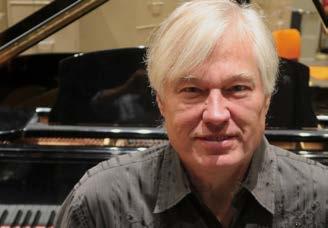 BY WILL BARROW
BY WILL BARROW
performing at several annual community events receive their wages through trust fund grants, including Franklin on July 4th, the annual Bellevue Picnic, Juneteenth celebrations, the Labor Day parade, and more.
These live concerts are an important part of giving back to our community, and we’re very proud to be a part of it. In an effort for as many members as possible to benefit from this program, Local 257 will be implementing limits per member, or cosponsor, of a certain number of performances per fiscal year, so that funds are available throughout the year for all members.
Looking for feedback
We continue to seek new ways to expand and improve the lives of our members. And in doing so, we always appreciate member’s feedback, ideas, and, most especially, involvement in what we have going on here. Please feel free to contact me at my email address. willb@nashvillemusicians.org
Happy music making!
APRIL – JUNE 2024 7
BETWEEN THE NOTES TNM
Jazz Night 1st week 7-9 p.m. World Music Night 2nd week 7-9 p.m. Musician-Songwriter Last week 7-9 p.m. Songwriting Classes 5/22 and 6/2 For more information visit our Facebook events page @nashvillemusiciansassociation FREE Wednesday Events at Local 257
NEWS
Parking pass update
The Local 257 60-percent off parking discount program with Premier/Metropolis now includes 13 downtown garages, and has saved our members a lot of money over the past four years. The old passes expired March 31, and the new QR code passes that took effect April 1 are at the front desk at the local. They must be picked up in person to ensure Premier that only AFM 257 members in good standing use them.
Here’s a list of the 13 garages that participate in the discount program:
• Jericho Lot — 215 Church St.
• FBC Lot A 118 7th Ave. S.
• FBC Lot B — 120 7th Ave. S.
• FBC Lot C — 600 Demonbreun St.
• Mercedes Lot 1 — 502 6th Ave. S.
• Mercedes Lot 2 — 601 Peabody St.
• Mercedes Lot 4 — 660 Lafayette St.
• One Nashville Annex — 177 3rd Ave. N.
• Platinum Lot — 432 6th Ave. S.
• Tennessee Lot — 123 7th Ave. N.
• Harvey Lot — 514 Church St.
• One Nashville Garage — 158 4th Ave. N.
• McKendree Garage — 140 6th Ave. N.
TSA instrument issues
If you’re heading to the airport soon with your instrument, you may need to allow extra time for check in. New smaller scanners are creating issues for traveling musicians. If the instrument doesn’t fit through the scanner, it has to be hand inspected. Pomeroy commented on the situation.
“We have been in touch with the leadership of Nashville’s BNA airport and the head of the national Transportation Security Agency to try and address this issue. Even though the rules we helped create a decade ago have not changed, this new methodology is problematic, to say the least. We are in discussions aimed at bringing back some of the larger scanners. It is a work in progress. We have also seen an increase in airline employees not understanding the rules for carry-on instruments, which is quite simple. If your instrument fits in the bin of the airplane you are flying on, and you board the plane early enough to find open space in the overhead bins, they cannot make you gate check your instrument,” Pomeroy said.
For a copy of the rules regarding instruments as carry-on luggage call the local (615244-9514) or go to nashvillemusicians.org.
Tennessee AI bill passes, but still needs work
The ELVIS Act was unanimously passed by the Tennessee Legislature and signed into law by Gov. Bill Lee on March 24, 2024, at Robert’s Western World. It is the first state-generated AI bill passed in the U.S., with the intent to urge Congress to do the same on a national level. Unfortunately, despite good intentions, the bill’s language is flawed and incomplete. It includes the words “likeness, voice, and image” but no references to musical performances. “In short, it protects Elvis but not the musical contributions of Scotty Moore, Bill Black or any of the other great musicians who backed Elvis over the years. It was rushed through the TN legislature without any input from Local 257, yet somehow our implied support was included in the PR for the bill. I have expressed our major disappointment about this, and have been assured by one of the bill’s cosponsors that he will work with us to include better language when the bill can be amended next January,” Pomeroy said.
Real AI protection and new streaming residuals
On another more positive AI note, our new contract with the motion picture and television industry is in ratification mode, which ended April 1, and has significant new language regarding AI. We will be able to use it as a template going forward in our other agreements, and to amend the Elvis Act. The new agreement with the AMPTP (Alliance of Motion Picture and Television Producers) also creates a new residual revenue stream for TV and films that are first exhibited on streaming services, which previously have never paid any residuals to musicians. This loophole is now closed, and will be a game changer for soundtrack work done under AFM contracts.
New AFM collaborative project will release more demos
Nashville publishers record more demos by far than any other music hub in the nation. If you’ve played on many recording sessions, you have an idea of how many sessions are for demos. Now a collaborative effort with the American Federation of Musicians, songwriters, and publishers will bring more of those rarely-heard demos to the public, and in so doing increase revenue for musicians.
The project is called Strait to the Heart, and will launch with an EP that includes demos of songs later cut by George Strait and Kenny Chesney. The five-song EP contains demos of “Carrying Your Love With Me” and “It Just Comes Natural.”
Music fans have long been fascinated with songwriter demos of songs that their favorite artists later turned into hits. “This project is another AFM success story that will bring more revenue to our incredibly hardworking musicians,” said AFM Local 257 President Dave Pomeroy. “Nashville pro session players create demos that in many cases, are used as templates for the master sessions that follow. The creativity of the musicians on the session results in riffs, rhythm tracks, and solos that often become signature sounds associated with the song, and help propel the following single releases and albums to megahit territory.
“Projects like these get those ‘rarities’ out where the public can enjoy them at last. And, this is just another reason why it is always smart to work on the card, whether it’s a demo, overdub, or master session,” Pomeroy said.
8 THE NASHVILLE MUSICIAN
TNM










In 3 years, The MLC has distributed $2+ billion in total royalties to rightsholders since our first royalty distribution in April 2021.
The MLC collects royalties from U.S. streaming services and then distributes them to songwriters or their music publishing partners.
Join The MLC today to start getting paid for your plays. Membership is FREE! themlc.com $2+
Streaming Royalties Distributed Over 38,000 Members





Billion
in
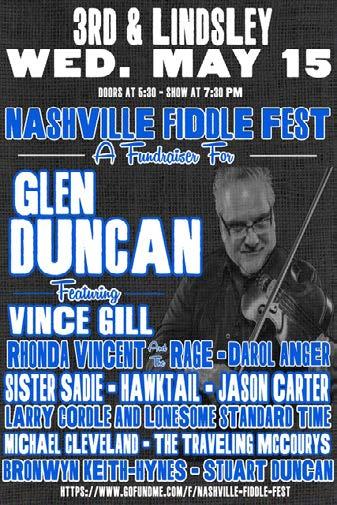
Nashville Fiddle Fest, a fundraiser concert for Glen Duncan, will be held Wednesday, May 15, at 3rd & Lindsley in Nashville. On Dec. 20, 2023, the legendary fiddle player suffered a stroke while driving, which resulted in an injury-producing car accident, and additional strokes in the days following. After surgeries and a lengthy hospital stay, Duncan returned home to begin his recovery. Organizers hope the fundraiser will help the Duncan family deal with ongoing expenses.
“This tragedy has been devastating for the Duncan family on many levels, and Glen needs 24/7 care. This has created a major financial burden for Glen and his devoted wife Marsha. Music City takes care of its own, and this will be a wonderful opportunity to help one of our iconic musicians as he continues to recover from this dreadful series of events. Thanks in advance for your help!” said Local 257 President Dave Pomeroy.
The event is scheduled to begin at 7:30 p.m. with doors opening at 5:30 p.m. Tickets may be purchased in advance at 3rdandlindsley.com To donate go to www. gofundme.com/f/nashville-fiddle-fest or use the QR code.
There will be a live auction of special items donated by Dolly Parton, Reba McEntire and more. The show will be live streamed for free on volume.com.


TRISHA YEARWOOD
Longtime Local 257 member Trisha Yearwood received the inaugural June Carter Cash Humanitarian Award at the 2024 CMT Music Awards held April 7 in Austin, Texas.
Yearwood’s philanthropic endeavors include two decades with Habitat For Humanity, establishing Dottie’s Yard and working with Stanford Women’s Cancer Center, work with the American Cancer Society, Humane Society, MusiCares, and many more charitable organizations. Yearwood was recognized as a Habitat Humanitarian in 2016. She also is a well-known mentor and advocate for other female artists, and leads the Five Decades, One Voice initiative.
Actress Jane Seymour presented the award to Yearwood, who said she felt lucky to be mentioned in the same sentence with Carter Cash. The winner of three Grammys, plus multiple CMA and ACM awards, said this honor was unique.
““June Carter Cash was a force and she was also married to a force. I know a little bit about a life like that,” said Yearwood, who has been married to Garth Brooks for nearly two decades. “I know it wasn’t always easy, but she found ways to make sure to keep shining in her own light and she had no bigger fan than her husband Johnny Cash. I also know a little bit about that.”
The new award recognizes an artist, duo/group or industry veteran who demonstrates dedication to their community and fellow artists, embodying Carter Cash’s spirit as a fierce advocate and initiator in paying it forward, helping others find their voice, and using their platform to inspire and uplift others.

DUANE EDDY
Local 257 life member Duane Eddy was honored with a star on the Music City Walk of Fame last fall in an event held Oct. 4 at the Walk of Fame Park in downtown Nashville. Other inductees at the ceremony included Joe Galante, Don McLean, and Darius Rucker.
Grammy winner Steve Warner inducted Eddy, whose distinctive twang — achieved by playing lead and a guitar’s bass strings — was a foundational part of early rock & roll.
“What an honor to induct the King of Twang into the Music City Walk of Fame! Duane Eddy is an absolute treasure!” Wariner said.
Eddy’s string of hits included “Rebel Rouser” and “Peter Gunn.” He was inducted into the Rock and Roll Hall of Fame in 1994, and the Musicians Hall of Fame in 2008. Walk of Fame inductees are recognized for their significant work in preserving the musical heritage of Nashville, and for contributing to the world through song.
EDITOR’S NOTE: AFM life member Duane Eddy passed away April 30. His obituary will appear in the July-September edition of The Nashville Musician.
10 THE NASHVILLE MUSICIAN
HEARD ON THE GRAPEVINE
GLEN DUNCAN

NIGHT TRAIN REVISITED
Nashville’s pioneering R&B scene, which held sway in Music City from the mid-40s through the ‘60s, is being revisited during the 20th anniversary of the “Night Train to Nashville” exhibit at the Country Music Hall of Fame and Museum. The museum is celebrating the 20th anniversary of its exhibit with “Night Train to Nashville: Music City Rhythm & Blues Revisited.” Many of the items from the 2004-05 original exhibit will be included in the new show, as well as recently discovered artifacts and photos.
Music City has nurtured an enormous cross section of genres since the mid-1800s, and in the mid 20th century as the country music business was just taking off, Nashville was also home to an incredible array of R&B artists who were performing in clubs, on radio and TV, and in the studio. These artists included Ray Charles, Etta James, Little Richard, and Local 257 members Billy Cox, who played here with Jimi Hendrix, and guitarist, vocalist, and
At a kickoff event for the exhibition April 27, a panel discussed the groundbreaking Nashville TV show. Church joined other panel members, including performers Katie Blackwell, wife of late Night Train creator and host Noble Blackwell, and Tracye Blackwell, daughter of Katie and Noble Blackwell, to talk about the impact of the program. The discussion was illustrated with video clips from Night Train
“The Night Train to Nashville exhibit brought attention to the R&B scene we were a part of back in the day, and got us all some work at a time when we needed it. We appreciate the CMHOF making sure that we are not forgotten, and we are glad ‘Night Train’ is back again!”
— Jimmy Church
bandleader Jimmy Church, who was a regular performer on the Night Train television program.
The Night Train Revisited exhibit includes the three-piece suit worn onstage by Church, a Nashville native who recorded with an R&B group while still in high school. In addition to Night Train, Church was regularly featured on The!!!!Beat
“This exhibit and its related resources offer opportunities to revisit Nashville’s often overlooked R&B legacy and its important role in our community becoming ‘Music City,’” said Kyle Young, CEO of the Country Music Hall of Fame and Museum. “As Nashville developed into a major recording center, it did so against a background of urban change and at a time when racial barriers were tested and sometimes broken on bandstands, inside recording studios and on the airwaves.”
The exhibit will run through September 2025.
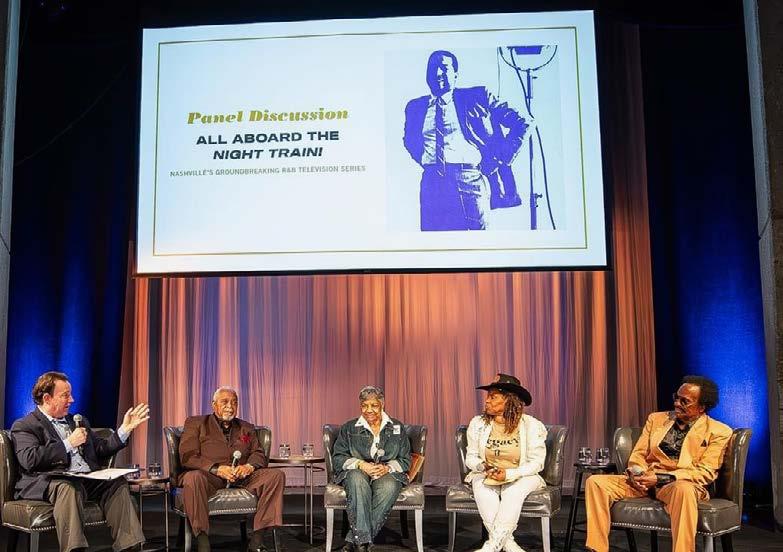
APRIL – JUNE 2024 11
HEARD ON THE GRAPEVINE TNM

There was a special guest at the March Local 257 musician-songwriter workshop earlier this year. Tim O’Connell (pictured in the center, wearing a white jacket), is a regular at the workshop, and also Nashville mayor Freddie O’Connell’s dad. “Tim wanted to feature a song he wrote for his son before


Freddie left for college. Mayor O’Connell (pictured in the center, wearing a suit) hung out for most of the workshop, and really enjoyed the experience,” said workshop host David Abdo.
NEW PIN

BETTY JOHNSTON BURNSED
Pianist Betty Johnston (BJ) Burnsed displayed her new 50-year pin and talked about what she’s been doing. “I am now volunteering my teaching skills to teach piano to foster children — It is extremely rewarding!”
12 THE NASHVILLE MUSICIAN GALLERY
Will Barrow leads his band Tudo Bem through the music of Ivan Lins at the monthly World Music Workshop.
Vinnie Ciesielski and his brass group The Hit Men blow the doors off the AFM 257 rehearsal hall!



Multi-instrumentalist Dan Dugmore was interviewed March 9 by Michael McCall for the Country
ongoing “Nashville
Bassist Mark Fain was featured in the Country Music Hall of Fame’s “Musician Spotlight” program on April 14. His musical guests were Local 257 members (l-r) Brent Rader, Lee Roy Parnell, and Local 802’s John Leventhal.

GALLERY TNM
Music Hall of Fame’s
Cats” series.
one CORD and the truth
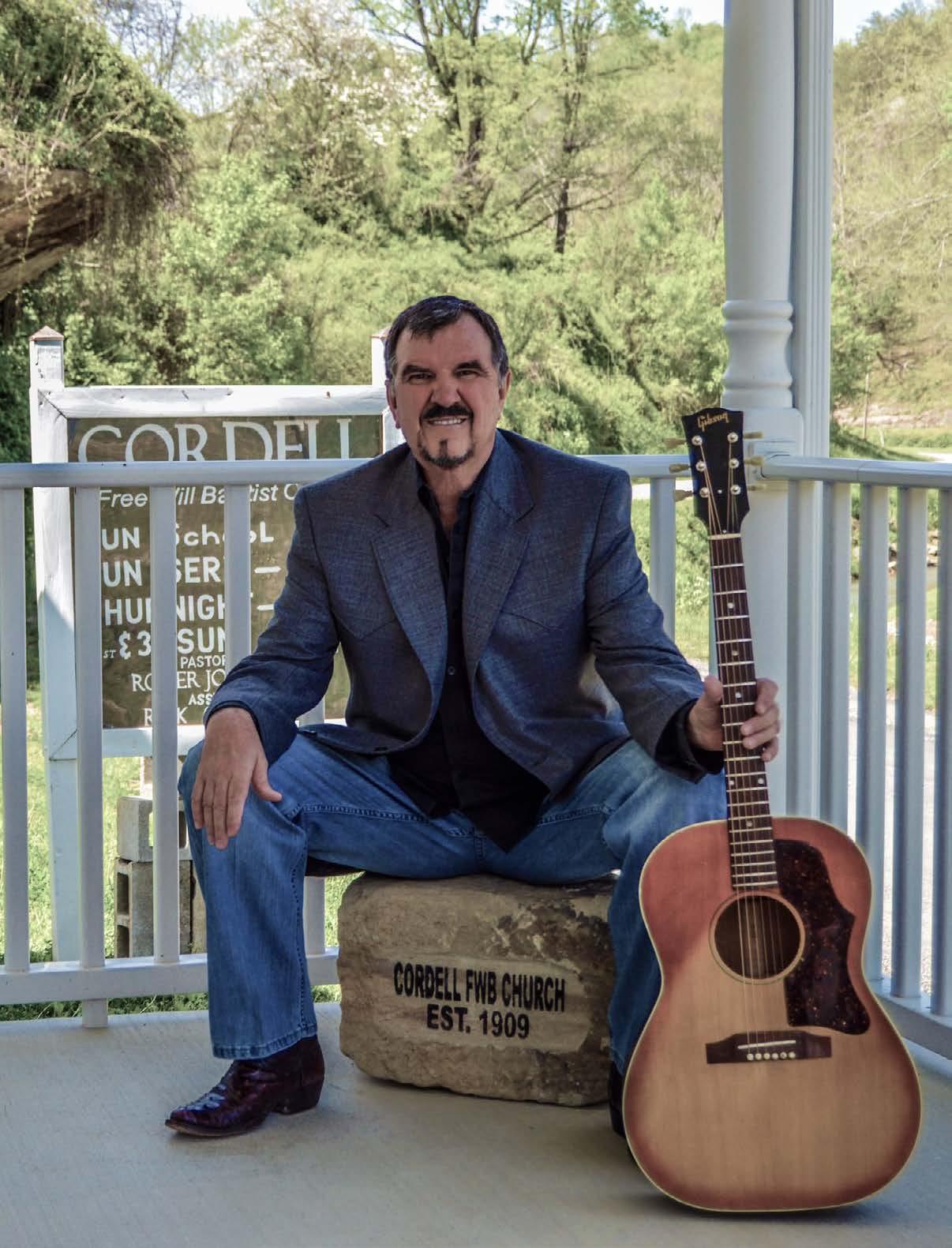 by warren denney
an interview with Larry Cordle
by warren denney
an interview with Larry Cordle

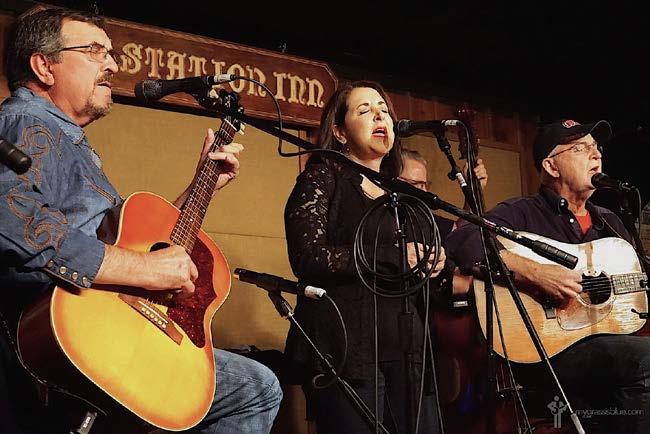
Larry Cordle does not walk around this earth with his head in the clouds.
Rather, Cordle, an immensely talented and greatly decorated songwriter, singer and musician, presents as a practical man who — by the way — has managed to track and trap the muse over the years. His songs have appeared on records for many artists, selling in the millions. They’ve been recorded by Ricky Skaggs, George Strait, Garth Brooks, Trisha Yearwood, Alison Krauss, Reba McEntire, Rhonda Vincent, Alan Jackson, and many, many others.
“The good Lord has been good to me,” Cordle said recently from his home in Hendersonville. “We were raised to work. I was raised on a little farm — and there’s one thing about music. You know you’re working hard, but it ain’t like digging a hole. You’re doing it because it’s something you love, and the love for me — I love great songs. If I could do a great song every day I would. But, you’re lucky to get a few of them as life goes on, if you work hard.”
There you have it.
continued on page 16
APRIL – JUNE 2024 15
New Monday at Station Inn: (l-r) Larry Cordle, Val Storey, Mike Bub, Carl Jackson
continued from page 15
His song “Murder on Music Row,” written with Larry Shell, earned the CMA Song of the Year award in 2000, as well as the CMA’s Event of the Year award for the song’s duet performance by George Strait and Alan Jackson. Cordle’s bluegrass band, Lonesome Standard Time, almost accidental in its origin, has enjoyed success at the top of the Bluegrass and Americana charts many times since its inception in 1990. He and the band have earned numerous awards within the IBMA, including Song of the Year in 1993 for “Lonesome Standard Time,” written with Jim Rushing, and again in 2000 for the original recording of “Murder on Music Row.” Lonesome Standard Time received Grammy nominations for Best Bluegrass Albums in 1992 for the self-titled Lonesome Standard Time and in 2000 for Murder on Music Row Additionally, “Lonesome Standard Time” served as the title track for Kathy Mattea’s 1992 gold record, and made its way as a single into the top 20 at the peak of her career. In other words, Cordle literally struck gold early, when by his own admission, he didn’t really know who he was or what his career might be.
“I knew the songs I wrote were kind of unique to me, and I thought these things may be hard to get recorded,” Cordle said. “It was before I was getting many songs, I guess. I chased that around until maybe 1987 or 1988, and I didn’t chase it around anymore. There wasn’t any point in chasing it around anymore. I became a bluegrass artist — and, that was the last thing on my mind when I moved here.”
Of course, the mythology of the Nashville songwriter pervades the city, and informs the chase of the elusive anointment, full of mysticism mixed with big breaks and hard work. There are unlikely stories surrounding the birth of some of the town’s biggest hits, and reverential whispers about lightning in a bottle.
It is, after all, a town still built on hope and risk, and Larry Cordle embodies it all.
At seventy-five, he is vibrant, though he has certainly faced challenges physically and spiritually, still performing bluegrass, country, and gospel with great play-
“I knew the songs I wrote were kind of unique to me, and I thought these things may be hard to get recorded,”
“It was before I was getting many songs, I guess. I chased that around until maybe 1987 or 1988, and I didn’t chase it around anymore. There wasn’t any point in chasing it around anymore. I became a bluegrass artist. It was the last thing on my mind when I moved here.”
ers and friends, holding forth at the Station Inn. In the still of conversation, he allows himself to look back on a career that might have never happened.
He was raised in eastern Kentucky, in the small community of Cordell, and went to high school in nearby Blaine.
“Music to my family was obviously part of the worship,” he said. “My mother and Dad were in various singing schools and had a quartet with my aunt and uncle when they were younger. They did that for a long time. They weren’t professionals, but they were very good. It was mostly community things, and a big part of their worship. It was country music, or bluegrass, or oldtimey music.
“It was how we blew off steam at the end of the week. Entertainment in 1960s Appalachia was hard to come by. Ricky Skaggs lived a mile from me, and although I was five years older than him, I got to be in a lot of things there. I was always invited to things when I started to play, even though I wasn’t very good. Ricky’s family was kind of like my second family. Our parents were close.
“But, the biggest thing about music for me and my family was the relaxation when the week was over. I don’t think anybody ever thought, certainly not me in a million years, that I’d wind up in the music business. I had the things that God gave me, but I didn’t have that real God thing for playing this stuff like Ricky and Keith [Whitley] and those guys had. Everything I got was hard for me.”
Cordle took a different track. He joined the Navy, and following his four-year stint, enrolled in college at Morehead State in Kentucky. He graduated with an accounting degree, but could not shake the music out of his system.
“I mean, I just kept chipping around at it and chipping around at it,” he said. “When I was in college, I was really heavily influenced by all this Southern rock stuff. That’s what I actually loved. And, I had always been a big blues nut, even when I was a kid.
“When they fused all that blues and rock and roll — these guys like the Allman Brothers Band and others like that — it hit me right between the eyes. The problem was I wasn’t good enough to do that.”
Songwriting had seldom entered his mind consciously, but it was there, darting in and out of the shadows of his awareness. He began to play around with it, and realized he understood the structure and process, at least to a degree. Growing up, there had been little indication he would — or could — take this road.
“Me and my cousin wrote a little old song when I was about fourteen years old, and I never thought about it again until I was about twenty-five,” Cordle said. “I realized for some reason I knew how to piece songs together. I didn’t know why I knew how to do that. It wasn’t anything I planned for or practiced. I did want to be in music, but frankly, I just didn’t consider myself good enough. When you’re raised around guys like Ricky
16 THE NASHVILLE MUSICIAN

and then Keith, who I had met when I was about seventeen — you’ve seen that sort of talent that bled through those kids — you start to think about doing something else.”
Cordle attended a performance by Tom T. Hall in 1974 that blew his mind, and he changed course. Enter lightning in a bottle, and the storied origins of “Highway 40 Blues.”
“I was kind of a fanatic for Tom T. because he was from the same part of the world as me,” Cordle said. “I really started trying to write songs after I’d seen him. I was working in a little old kind of countryrock thing over in Hazard, Kentucky, and I was trying to be a CPA during the day. I was killing myself, man, and I was working day and night.
“I had that song melody locked in my head some way. It came to me one night. I lived on Kentucky State Route 40, and I always consider it God’s gift to me to get me out of what I was doing.
“I wrote it in 1975. It was not a record until seven years later.”
Cordle would play it at parties with another song or two he had written, before he finally told Skaggs about it in 1976, who encouraged him to meet in Lexington and put his songs down to copyright. His old friend helped him by recording them with
a handheld tape recorder, and Cordle sent them off.
“I was tired of running seventy miles from Hazard to Paintsville through the mountains. I had been doing it for almost two years before I moved to Lexington and got a gig down there. I was in the nightmare of two worlds — either just work and make a living like everybody else does, or wonder all the time if I could make as much doing music that’s something I enjoy, and doesn’t feel like work.”
Skaggs was impressed by what he had heard. He produced a record on Cordle that included “Highway 40 Blues,” “The Hero of the Creek,” “Two Highways,” “Don’t Stop Gypsy,” — songs that Skaggs would ultimately record. Of course, it was his version of “Highway 40 Blues” in 1983 that would become Skaggs’ first No. 1 hit and help fuel a career that would ultimately land him in the Country Music Hall of Fame, and launch Cordle’s life as a hit songwriter.
Skaggs encouraged Cordle to move to Nashville, a thought he could not have entertained just a few years before as an modest accountant by day and a breakneck country-rocker skittering along the Kentucky highways by night.
“Coming from where I had come from with all of it, and to have the idea of moving
to Nashville, that was everybody’s dream,” Cordle said. “I mean, all the local musicians back home dreamed about coming to Nashville and playing the Grand Ole Opry. I grew up listening to it all the time.”
He made the move in 1985 and became a staff songwriter for Amanda-Lin Music, Skaggs’ company that was partnered with Welk Music. It turned out to be the chance and the education of a lifetime. He was on a draw, at least, and was soon meeting writers like Bob McDill, Dickey Lee, Carl Jackson, and others who could teach him his way around a song, and around town. He was raw goods, still.
“They were paying me to try to get another foot forward, you understand,” he said. “I wanted to do it because by the time it was offered, “Highway 40 Blues” was already a foregone conclusion. It wound up being the best thing I’ve ever done in life because without that song, I’m positive the other songs would have never been. I was in my thirties. I needed to be away from the lifestyle where I was playing every night, and not treating myself well.
“I may not be the greatest guitar player on the planet Earth, but I can do this. I didn’t know that I would get to the level I did, but the playing clubs six and seven nights a week was [no future].”
The move still held great risk. Cordle was never convinced he had the ability to compete in this world, or the staying power. He had a wife, Wanda, and daughter to continued on page 18
“I realized for some reason I knew how to piece songs together. I didn’t know why I knew how to do that. It wasn’t anything I planned for or practiced.”
APRIL – JUNE 2024 17
Lonesome Standard Time
continued from page 17
consider, and even though his club grind had been wearing him out, he was putting more real money in his pocket in Kentucky. He recalls a night in the audience with his wife at the Bluebird Cafe, courtesy of Welk Music.
“We went to see the show at the Bluebird, and it was Vince Gill and Pam Tillis, and others, so I already knew how great it would be,” he said. “We walk in and this thing goes around one time. They’re playing their rear ends off and singing these songs that they’ve written. They’re great. I looked straight around at Wanda, and I said, ‘Man, what am I going to do down here?
“Evidently it was meant to be, as it turned out. I’ve had a good run writing songs.”
So, a Southern rocker turned burgeoning songwriter with a monster hit under his belt is not the precise background required to become a household name in bluegrass, but it is precisely the road taken by Cordle. “It’s funny, but at the heart of things, I’ve always thought of myself as a singer,” he said. “I could keep jobs because I could sing, and I could sing parts. I could sing, you know?”
Lonesome Standard Time certainly benefitted, and Cordle has been featured on lead and background vocals for many other artists.
“When I look back on how things came together, I couldn’t have guessed any of it,” he said. “I was raised hearing bluegrass, but never thought I’d be playing it. I’d been going to the Bell Cove Club in Hendersonville to a songwriter’s night. I became friends with the owner Joy Ford, and she told us we should come hear a great bluegrass band there.
“I was like ‘a bluegrass band’? Really? It was Derwin Hinson and his brother Danny, Kenny Lewis, and Steve Thomas. They found out I’ve got ‘Highway 40 Blues’ and a couple of other songs. They asked me to sit in with them and do a couple. And, I knew a bunch of old bluegrass songs because of my upbringing. I joined up with them and we asked Glen Duncan to come down from Lexington and play the fiddle. When Glen started playing, that thing took off on a whole different thing.”




A different thing, yes, one that proved to be the beginning of a sustaining life for Cordle. He would work there, playing every Wednesday night for close to six years between 1986 and 1992 when things skyrocketed with Lonesome Standard Time. The unassuming club became a hotbed for bluegrass, and Wednesday nights were the ticket. Within six months of Cordle
throwing in, bluegrass founding father and Country Music Hall of Fame member Bill Monroe appeared. He would move from the audience to the stage each of those nights, listening and performing, himself. Cordle would play with him. These were defining days.
It was Monroe that ultimately gave him affirmation, and inspiration.
18 THE NASHVILLE MUSICIAN
Larry and his granddaughter
Larry and his father
Larry and Wanda Cordle with grandchildren
Larry and his mother
“Buck White brought him up there where we were working one night.” Cordle said. “And from the time Buck brought him up there, he came every Wednesday as long as I worked. And from that point on, there was no place to be except there on Wednesday night.”
As the gig progressed, Monroe would bring guests — players like Marty Stuart and Ronnie McCoury — and Cordle would hang on. It was a trial by fire in many ways, and he passed. He and Monroe became good friends. And, one Wednesday night Monroe took him by the arm and said what he needed to hear.
“He said ‘Listen here — you really should be doing your own numbers,” Cordle said. “I was doing two or three of my songs during the gigs. I had a lot of nerve back then — we’d try to work them up.
“That he would single me out and say that to me. It meant everything to me. He said ‘if you do that and do that right, boy, it’ll go from your heart to their heart, and they’ll understand it, too.”
From that moment, Cordle thought of himself, and his calling, differently. Ultimately, he would play a showcase in Owensboro, Kentucky, with Duncan, Butch Baldasarri, Mike Bub, and Wayne Southards that became the big bang moment. A record deal with Sugar Hill. The Grand Ole Opry. Song of the Year. His life.
“It was crazy,” he said. “It just was absolutely was, because we were just kind of having fun. It was a lark, and to have all that happen — winning and the whole thing within a year, or a year-and-a-half, just amazing. At the time, it didn’t seem as big a deal as it does to me now, when I look back at it. At the end of the day, we were just working. My songwriting was supporting my habit. That’s as simple as I can put it. And I was enjoying every Wednesday of my life. I really was, and once I found out I could at least keep up with these guys — thank God I hung with it.”
Different band members and very special guests have moved through the Lonesome Standard Time community over the years, and Cordle has persevered, remain-
ing active and productive — playing to all his strengths.
He was inducted into the Kentucky Music Hall of Fame in 2015. Most recently, he released the acclaimed Where The Trees Know My Name in 2021 on Mighty Cord Records, which featured three chart-topping bluegrass singles “Cherokee Fiddle,” “Breakin’ on the Jimmy Ridge,” and “Sailor’s Regret.”
Cordle’s involvement in the Gospel Music Association Dove Award for Bluegrass/Country/Roots Recorded Song of the Year in 2022 for Dolly Parton’s “In the Sweet By and By,” was further validation of his staying power. That group featuring Parton, Cordle, Carl Jackson, Jerry Salley, and Bradley Walker earned IBMA awards for Collaborative Recording of the Year and Gospel Recorded Song of the Year.
“I’ve got a new album I’m going to release in the summer,” he said. “I’ve had two No. 1 songs in that world this year. I’m not working the road like I used to. I’m lucky I’ve got the gigs at The Station Inn. It keeps the Jones of wanting to play off me.
“Amazing that it’s been thirteen years there. Val [Storey] told me the other night. The Monday thing for that long, and Sunday’s been going on for four or five. We’ve got a great [core] band. Me and Val, Carl Jackson and Mike Bub, along with a little different cast — Blaine Johnson who is a remarkable piano player, and Wayne Dawes playing steel, and David Mansfield on fiddle.
“Bob McDill told me one time, ‘Work hard to save your money,’ and it sounded like I was being thrown off at the time, but it was great advice. [He knew I needed to work hard.] There’s great gaps in your work. There’s great highs and there’s great lows. Evidently it’s what God wanted me to do, or I’d have had to do something else …
“Time works things out like it’s supposed to.”
“He [Bill Monroe] said ‘Listen here — you should be doing your own numbers...If you do that and do that right, boy, it’ll go from your heart to their heart.’ That he would single me out and say that, meant everything to me.”

Larry’s RIG
“Blue ridge (Saga Music) special made the guitar I’m using. The body is made on a 000 scale and the neck is short. It’s off at the 12th fret. A childhood accident took my range of motion away in my left hand, strength too. My left hand is about half the strength of my right one. The shorter neck helps me to get my hand in a better position to make chords — especially any barre chords or anything up at the 1st fret.
Anyhow, it says inside Larry Cordle Model and there is only one of them.
“I am using Fishman electronics. For bluegrass gigs I most often use a Line 6 Wireless rig, G 10 model. For most other gigs — songwriter shows, country things etc. — I use an LR Baggs Venue full isolation D.I. It has great a great preamp and enables me to dial out unpleasant frequencies that are inherent in some rooms.”
APRIL – JUNE 2024 19 TNM
It’s impossible to measure the extent of Chet Atkins’ influence on the universe of music as a whole, and the world of guitar players in particular. In addition, his huge role in the organic evolution of Nashville into Music City has had a multigenerational effect. It is hard to believe that Atkins has been gone more than 20 years, yet his influence and legacy continues to grow in ways perhaps only he could have imagined.
We Still Can’t Say Goodbye is a wondeful tribute album to Atkins, featuring many of Local 257’s finest players and singers, and impeccably produced by Carl Jackson, longtime AFM Local 256-733 member, who is one of many who had the good fortune to be influenced and mentored by the man known as Mr. Guitar. Fittingly, the album begins with that song, which was written by Tommy Emmanuel, C.G.P., for his 1997 collaborative album with Atkins, The Day Finger Pickers Took Over the World. This version of “Mr. Guitar” is a powerful arrangement featuring Emmanuel and master fiddler Michael Cleveland pushing each other’s boundaries. Their laughter at the end of the song reflects the joy to be heard throughout this record, and sets the mood for the musical magic to come.
Next up is Brent Mason, who plays a smoking version of “Lover Come Back to Me.” His nimble phrasing and whammy bar moves echo the man himself, while giving it his own distinctive stamp. Bradley Walker and Vince Gill team up for a sweet version of the Everly Brothers classic “So Sad (To Watch Good Love Go Bad),” bringing back beautiful memories and featuring longtime Atkins fan Eric Clapton on electric and acoustic guitars, as well as Local 257’s Mike Johnson on steel, Kevin Grantt on bass and Catherine Marx on piano, all of whom play with taste, grace, and passion on multiple tracks throughout the album. Ricky Skaggs and Charlie McCoy team up for an excellent version of “Yakety Axe,” trading hot licks as if Atkins is sitting in the room, nodding his head with approval.
“Sleepwalk” is given a gorgeous arrangement by the power duo of Jerry Douglas on dobro and Bryan Sutton on acoustic guitar, with Dennis Crouch adding all the right notes on acoustic bass. “In His Hands” is a heartfelt song that is written, sung, and played by Jackson in tribute to Atkins, Mickey Mantle, and Jesus Christ,

We Still Can’t Say Goodbye –A Tribute to Chet Atkins
Various Artists | Morningstar Records

a combination few songwriters could pull off, but Jackson does. The lovely string arrangement by David Davidson, played by Davidson, David Angell, Kristin Wilkinson, and Carole Rabinowitz, perfectly complements Jackson’s heartfelt vocal. “Windy and Warm” features Brad Paisley, who brings a funky, overdriven guitar sound to one of the most memorable songs in Atkins’ repertoire, written by the great John D. Loudermilk.
“How’s the World Treating You,” features James Taylor and Alison Krauss, whose vocal blend is breathtaking on this country classic, written by Atkins with Boudleaux Bryant and covered by many artists, including Eddy Arnold and Elvis. Jackson and the core band back this epic duo performance perfectly. Guthrie Trapp’s evocative version of Duke Ellington’s “Caravan” features his unpredictable, melodic improvisational guitar style with an extended fade that leaves the listener still wanting more. John
Knowles, C.G.P., brings the ragtime classic “The Entertainer” to the party, and he and Marx take the listener back to a simpler time and place, perfectly capturing the spirit of Atkins’ ability to incorporate a wide window of influences and still sound like Chet.
Other memorable tracks include “Alley Cat” by Ashley Campbell and Thor Jensen, “Mr. Sandman” by Gareth Pearson, and “All I Ever Need is You” by Sierra Hull. “I Still Can’t Say Goodbye” is a classic song that, late in his career, Atkins would sing in honor of his father, and Gill was the perfect choice to take on that mantle. His emotional vocal brings a tear to the eye, and again, Davidson frames this performance in a beautiful string arrangement with Angell, Wilkinson, and Rabinowitz surrounding Gill with all the right stuff.
The album closes with an epic version of “Freight Train,” kicked off by Jackson and Knowles, and featuring an incredible sequence of guitar solos over the course of 5 1/2 minutes. The soloists include, in order, Jackson, Clapton, Trapp, Sutton, Campbell, Mason, Emmanuel, Skaggs, Hull, Gill, Isaac Moore, Knowles, Paisley, Jensen, Pearson, and Jackson. It’s a wild ending to an amazing musical tribute honoring the man who changed so many lives in so many ways. Kudos to the many Local 257 members who worked on this, and everyone involved, including Luke Wooten, who engineered the album and especially to Carl Jackson for bringing this excellent album to fruition with the respect and love it deserved. Long live Chet Atkins!
— Roy Montana
20 THE NASHVILLE MUSICIAN
REVIEWS
Chet Atkins
Hold to a Dream –A New Grass Odyssey
John Cowan with Jimmy Schwartz | Backbeat Books

This is a fascinating book that goes far beyond the “my story” theme of so many musician autobiographies. Renowned bassist, powerful vocalist and AFM Local 257 life member John Cowan has a unique musical history as a key member of the influential band New Grass Revival, acclaimed solo artist, longstanding member of the Doobie Brothers, and recent cofounder of the Herculeons band with the unmatched singer and violinist Andrea Zonn. He opens the
The chapters are comprised of Cowan interviewing friends, colleagues, and other musicians who influenced him — and who just happen to be musical icons.
book by telling his own story in a straightforward, modest way, but that is just the beginning of the journey. The next 15 chapters are comprised of Cowan interviewing friends, colleagues, and other musicians who influenced him — and who just happen to be musical icons. The insights are deep and powerful. He opens each section and interview with further points of interest and his personal intersection with each artist, tying it all together.
The first segment, “Playing in the Band,” starts with Leon Russell, and sets the tone for what is to come. The questions and answers are wide-ranging, honest and atypical, and bring out the back stories in a way that makes you feel as if you are part of a conversation between friends. Russell speaks of many things including his time in Los Angeles, the memorable trip to Nashville
to make the album Hank Wilson’s Back with many of the top session players of the time, and more. The chemistry between Cowan and Sam Bush is legendary, and their collaboration in New Grass Revival from 1974 to 1990 was literally a game changer in the collision of styles that eventually came together under what would become the Americana banner, but will always be known as New Grass to those who witnessed the transformation firsthand. Béla Fleck, who also came to prominence as a member of New Grass Revival, shares his unique perspective on the evolution of American roots music as he continues to push all boundaries and accept no limitations as to what the banjo can do.
“All for a Song” features enlightening interviews with three of the finest songwrit-
continued on page 22


APRIL – JUNE 2024 21 REVIEWS
ers ever — Kris Kristofferson, the late Loretta Lynn, and Rodney Crowell, all longtime Local 257 members. Cowan asks them the right questions and in return the answers are intimate, personal and powerful. The stories range from Kristofferson talking about his days as a janitor in Nashville’s Columbia Studios and getting his first record deal, to Loretta’s childhood memories and long, arduous journey to Nashville. Crowell’s encounters with Guy Clark and Mickey Newbury illuminate his chosen path as a singer/songwriter.
“Birds of Song” covers a trio of great singers revealing some of their deepest thoughts and secrets. Bonnie Bramlett is unflinchingly honest with Cowan, and her firsthand account of the Delaney & Bonnie days when Eric Clapton talked his way into their band is jaw dropping. The late Gordon Stoker of the Jordanaires is full of facts and figures that demonstrate how the legendary vocal group maneuvered its way through one of the most prolific recording careers ever. Sam Moore of Sam & Dave provides several unexpected flashbacks regarding his musical history, tells stories about Sam Cooke and Jackie Wilson, and shows once again that what exactly defines a hit is still unpredictable.
Chris Hillman, Bernie Leadon, and Jim Messina make up “Pacific Standard Time,” a section devoted to the West Coast version of country music that eventually reverberated in Nashville too. Hillman has had one of the most interesting careers ever, from The Byrds to the Burrito Brothers,
Souther Hillman Furay Band, Desert Rose and more. His perspective and stories of those wild days are moving, funny, and sometimes sad, but definitely real. Bernie Leadon’s tales of the Eagles are epic and reflect the changing business models of the early ‘70s, as well as the complexity of a band’s internal dynamics. The evolution of Jim Messina’s career is intriguing and Cowan’s interview style allows him plenty of room to tell his story.
The final section, “Prog and Progeny,” takes things to the outer edges of Cowan’s musical influences and back around to Nashville.
The interviews with Chicago’s Robert Lamm, and Justin Hayward of the Moody Blues touch on seminal moments in the late ‘60s-early ‘70s evolution of rock and pop music that shaped a generation and are fascinating to read, even this long after those tumultuous times. The book winds up with an excellent conversation with John Carter Cash, who not only has carried on his father’s legacy but also the Carter Family’s as well. His insights into his family’s parallel histories are spot on and inspiring.
stories we thought we knew, and shines a light on things we may never have thought about. His prefaces and observations tie it all together, and makes for a most enjoyable and informative reading experience that would be hard to find elsewhere.
Roy Montana

This book is accessible and enlightening. The casual intimacy of these conversations brings the reader into the room with Cowan and his interview subjects. It provides very different perspectives on some


CLEANING LET THE PROS DO THE SPECIALIZING IN MUSIC ROW OFFICES AND RECORDING STUDIOS AFTER HOURS CLEANING KITCHENS BATHROOMS COMMON AREAS CONTROL ROOMS AND TRACKING ROOMS WE ARE GROWING AND WANT TO CLEAN FOR YOU 615-477-4097 CALL NOW FOR A FREE ESTIMATE MUSIC ROW’S CLEANING PROS HAS BEEN THE #1 COMMERCIAL CLEANING COMPANY SERVICING THE NASHVILLE MUSIC INDUSTRY FOR OVER 30 YEARS. CLIENTS INCLUDE BIG MACHINE RECORDS STARSTRUCK ENTERTAINMENT THE BLACKBIRD ACADEMY AND STUDIOS STUDIO 28 RECORDING STUDIOS LOVE SHACK RECORDING STUDIO CURB 43 STUDIO RED STREET RECORDS continued from page 21 22 THE NASHVILLE MUSICIAN TNM REVIEWS The casual intimacy of these conversations brings the reader into the room with Cowan and his interview subjects.

 BY MELINDA WHITLEY
BY MELINDA WHITLEY
BY
Many orchestras have experienced great success in their recent negotiations and I hope we will join them.
the time this article is published, The Musicians of the Nashville Symphony, along with Local 257 President Dave Pomeroy and our attorney Kevin Case, will be firmly into the formal negotiation process for a new collective bargaining agreement (CBA). Our current CBA expires July 31, 2024. We have been busy preparing ourselves, and especially our newer musicians, as we enter into their first CBA negotiation process in a professional orchestra. Without going into too much detail, I thought it might be helpful to share a bit of my own perspective on our process.
I won a national audition for my current position in the NSO in 1999, after being the runner-up here in a national audition in 1994, and after winning a local audition for our sub-list a few years before that. From 1998-2000 the NSO enjoyed some significant growth and restoration through the contract negotiation process. Part of that growth included the purposeful addition of 16 tenure-track string players to the ensemble through our national audition process, planned for and accomplished, over the course of those two years. We were often referred to at the time as “The Sweet Sixteen.” I’m happy to say I was one of them, and I am not the only one of us who is still in the orchestra.
I joined the NSO just as the organization was on a very upward trajectory. We joined the International Conference of Symphony and Opera Musicians and the AFM Strike Fund in 2000, the same year we went on tour to Carnegie Hall. Concurrently, our Time for Greatness campaign raised the funds to build our beautiful Schermerhorn Symphony Center. Recording in our new hall helped us to win our first and most meaningful Grammy Awards for Best Orchestral Performance
and Best Classical Album for our Joan Tower Made in America recording in 2007. While none of those things were negotiated into a contract, it was our steady efforts to work together as an organization that allowed us to make such significant strides in our work. Our contracts negotiated in 2001 and 2007 included increases in the number of musicians on stage, better benefits, and refined work rules. We became more unified in both our workload and in our efforts to function as an organization. We could see where we had been, and began to imagine where we could go.
During the period between 2007-2012, the organization was able to overcome many challenges through collaborative negotiations. For example, the market crash of 2008 created a financial crisis and restructuring. In 2010, the flood came and created significant challenges, yet we kept working together to solve our problems and managed to win another meaningful Best Orchestral Performance Grammy Award in the same year! Our continued collaborations brought us other good things. In 2012, we returned to Carnegie Hall under Giancarlo Guerrero. We also achieved a milestone salary level that made me feel like I had won another job without having to win an audition in another city. While every solution to every problem was not ideal from everyone’s perspective, I started to relax and enjoy my musical life here. I stopped taking auditions for other orchestras and put down some serious roots in Nashville.
In 2013 we had another big crisis, a situation that we still work to improve today. Yet at the time, everyone made difficult decisions in our formal negotiation process that showed the strength of our commitment to the organization, and the result was a four-year agreement reached in 2014. It is
a hard reality to learn about the negotiation process - that we never get everything we want. It is a bit like buying a house. Both the seller and the buyer have goals and a wish list, and they negotiate with each other for an agreement they can each live with and use to build the future they want. Possibly because we maintained a positive attitude in tough times, our resulting negotiations in 2018 were relatively amicable and achieved a fair four-year contract that put us in a leadership role in several areas. Our most recent negotiations in 2021 were subjected to the realities of our 2020 pandemic world. That situation challenged everyone more than we could have imagined. Most importantly, we survived to negotiate another day.
Now we enter into negotiations again. I expect all parties have done their best to prepare for the task at hand. We know that we will not agree on everything. The nature of negotiations is inherently adversarial, but that does not mean the process is a bad thing. It is a well-used method to solve problems and prevent future conflicts. In this case: Two sides with a common purpose will come together around a table. They will each bring their own needs and interests, and do their best to advocate for their goals. That is a good thing. We can find common ground. We can creatively solve problems together. We can maintain good working relationships, even in the midst of feeling all the emotions that come with the process, because we understand the emotions mean we care.
Many orchestras have experienced great success in their recent negotiations and I hope we will join them soon. I am comforted by the fact that no matter what has transpired here, the one thing we have always done, is continue to talk to each other.
24 THE NASHVILLE MUSICIAN
SYMPHONY NOTES
TNM
Lots of changes in the jazz and blues summer scene since last year, so we’ll start with the latest news and catch up wth the rest next quarter.
Nashville
A popular blues jam location, Twin Kegs II on Hermitage Avenue, has given up the battle against the increasingly high cost of property leases. The owner did not want to renew the lease, and while the club would like to reopen in a new location, nothing as yet seems viable. Opened in 2014, its last jam was in March. Twin Kegs 1 opened in 1979 and is still going strong with the name Rosie’s Twin Kegs.
Nashville’s newest green space is aiming to preserve history in a neighborhood facing displacement. The pocket park located on 16th Avenue and Jefferson Street is named after North Nashville entrepreneur Kossie Gardner, Sr. With a legacy dating back 100 years, Gardner is known for his role in the creation of the affluent Gold Coast neighborhood in Bordeaux, Nashville’s first African American subdivision. He also operated a Jefferson Street funeral home just steps away from the new Kossie Gardner Sr. Park. “We worked with the [Metro] Historical Commission and the [Metro] Arts Commission, really to make sure that any art or historical acknowledgments that


are here, recognize and take into consideration the culture of this neighborhood,” Metro Parks Director Monique Odom said. A major element of the park is a covered outdoor stage. Gardner’s son, Kossie Gardner, Jr., was a Nashville legend as a jazz and soul organ player, so stand by for news of jazz and blues concerts in the new park this summer.
Last year, WFSK 88.1 FM, celebrated its 50th anniversary. Historically, WFSK was the first African American-owned and operated FM radio station in Nashville. WFSK continues to have a large impact on the local community; when Fisk students started to play jazz in the 1970s, WFSK became the first station to broadcast such music in the area, later joined by WMOT in Murfreesboro.
The Jefferson St. United Merchants Partnership (JUMP) Presents the 23rd Annual Jefferson St. Jazz & Blues Festival July 20 at the Edward S. Temple Track on Walter S. Davis Boulevard. Music is anticipated to run 9 a.m. - 6 p.m. Artists to be announced.
The Schermerhorn Symphony Center presents bassist Marcus Miller with the Nashville Symphony May 22, at 7:30 p.m. Miller is a legend in American jazz and pop, and has played with musicians like Miles Davis, Luther Vandross, Frank Sinatra, and Michael Jackson. The sound of an electric bass with a symphony will probably be something new for most people.
Highlights in Metro Parks include Big Band Dances in Centennial Park from June 1 to August 31. These Saturday night familyoriented affairs include dance lessons (6:30 p.m.) and food trucks. Red Caboose Park offers concerts every Friday night in June at 7:00 p.m with the Kelli Cox Collaborative
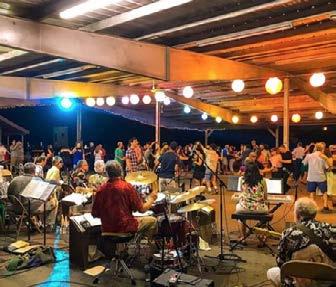
 BY AUSTIN BEALMEAR
BY AUSTIN BEALMEAR
performing June 28. For a full schedule of bands at each venue, go to nashville.gov/ departments/parks/cultural-arts/music
Murfreesboro
Murfreesboro has a new 24-hour nonprofit radio station primarily for jazz and blues, WQJZ 103.9 FM. Started by two guys who take credit for starting the MTSU campus station WMOT that broadcast blues and jazz for almost 30 years, Jim Gilmore and Ken Burger are broadcasting jazz and blues within approximately a 20-mile radius of Burger’s law firm on the Murfreesboro Public Square. Not only is the station pumping out the blues and jazz standards, but also community outreach and public service. As Burger puts it, “we try to be the voice of the underdog.”
Burger, the main man behind the microphone, is a 71-year-old attorney, and seasoned broadcaster. Burger says, “Our real fundamental purpose isn’t to give people B.B. King and Sérgio Mendes. Our purpose is in between the music. Any public service organization that wants to put on a program or an advertisement should contact us.” Call 615-513-9882 for more information.
Remember the annual Murfreesboro JazzFest held in the public square every spring? Last year the event changed to present various local, middle and high school jazz bands from schools in Murfreesboro, La Vergne and Smyrna. In late April the new JazzFest took place for the second time at The Fountains on Medical Center Parkway. Rutherford County Fine Arts Coordinator Lindsay Halford has been providing support to participating band directors to help ensure the success of JazzFest. “This is an important opportunity for students to perform on a big stage, for a larger crowd. It’s a premier performance opportunity for them,” Halford said. JazzFest has been a large motivating factor in curating strong jazz programs within the local schools.
See you out there.
APRIL – JUNE 2024 25
JAZZ & BLUES BEAT TNM
Performance venue at Kossie Gardner Sr. Park.
A park display commemorates the vibrant history of Jefferson Street.

E Buck Trent
Feb. 17, 1938 – Oct. 9, 2023
ntertainer and multi-instrumentalist Buck Trent died Oct. 9, 2023. He was the inventor of the electric banjo and the last surviving member of the Porter Wagoner Band — widely recognized as the chief architect of that group’s innovative and unique sound. Trent was a 63-year life member of the Nashville Musicians Association who joined Local 257 March 11, 1960.
He was born Charles Wilburn Trent Feb. 17, 1938, in Spartanburg, South Carolina, to Charles Hugh and Viola Johnson Trent. He started his musical journey on a Hawaiian lap steel guitar, and when he told his mother he would make a living on a banjo if she bought him one, she obliged. He performed on radio shows starting at age 10. When he was 17, he was playing on the road, and when he turned 21 he moved to Nashville and joined the Bill Carlisle Show, which led to his first Grand Ole Opry appearance.
It was at this early stage of his career that he invented the electric banjo, by replacing the bridge on a banjo with a filed-down Steven’s bar given to him by steel guitarist Howard White. The bar (altered for use as a capo) plus a pickup made the banjo louder, and the electrification process, with a little help from Shot Jackson, was complete.
Trent joined the Porter Wagoner Show in 1962, bringing his innovative instrument and a creative flair for altering the sound of the banjo to make it sound more like a steel guitar. Trent’s contributions were not limited to his unusual banjo stylings — he was also skilled on guitar, dobro, steel, mandolin, and bass. He would remain with the group for 12 years. Another cast member, Dolly Parton, would use Trent on many of her demos and master recordings, including classics like “Jolene,” “I Will Always Love You,” and “Coat of Many Colors.”
Trent teamed up with another great instrumentalist in 1974, when he joined Roy Clark for a world tour. They were the first country act to play in the Soviet Union. The pair went on to release two albums together: A Pair of Fives and Banjo Bandits. Trent and Clark received the CMA Instrumentalist Group of the Year award in 1975 and 1976, and Trent joined the cast of Hee Haw ; his “Talking Blues” spot was a popular recurring segment on the show.
Trent opened a breakfast theater in Branson, Missouri, in 1991; the morning show was one of the longest running at the country music tourist destination.
Trent’s last recording was Spartanburg Blues, which featured many of his good friends and fellow artists. Among them were Parton, Connie Smith, Vince Gill, Jeannie Seely, David Frizzell, Pretty Miss Norma Jean, The Oak Ridge Boys, Rhonda Vincent, and Marty Stuart & His Fabulous Superlatives. His last television appearance was for Parton’s 50th anniversary Grand Ole Opry celebration.
“Buck was an incredibly innovative musician and one of the funniest people I have ever known. That grin and sparkle in his eyes was special, and he could sure make that banjo sing.” — Dave Pomeroy
Trent enjoyed golf and played often — his residence was on the golf course in Branson, which he enjoyed not only for its convenience, but also for allowing him to greet passing golfers and fans. The Branson mayor proclaimed Dec. 13 Buck Trent Day. The American Banjo Museum in Oklahoma City inducted Trent posthumously on Oct. 13, 2023.
In addition to his parents, Trent was preceded in death by one aunt, Florence Johnson Hood; one sister, Peggy Genell Trent Marlin; and one nephew.
Survivors include his wife of 37 years, Jean Marie Trent; one son, Charles William Trent; one daughter, Melissa Trent Hood; four grandchildren; four great-grandchildren; and numerous nieces and nephews.
Funeral services were held at Spring Hill Funeral Home and Cemetery in Nashville on Oct. 21, with interment following. On March 10, 2024, family, friends and fans gathered at Wranglers Honky Tonk in Branson to celebrate Trent’s life and music. The family wishes to extend their gratitude to Dr. Charlie Rasmussen and the Good Shepherd Hospice of Branson for their loving care. Donations may be made in Trent’s memory to Marty Stuart’s Congress of Country Music, P.O. Box 1126, Philadelphia, MS, 39350, or online at www. congressofcountrymusic.org/give

26 THE NASHVILLE MUSICIAN FINAL NOTES
Dolly Parton and Buck Trent
 MICHAEL J. HENDERSON
MICHAEL J. HENDERSON
July 14, 1953 – Sept. 22, 2023
Acclaimed guitarist and multiplatinum, Grammy-winning songwriter Michael J. Henderson, 70, died Sept. 22, 2023. Founder of the bluegrass band the SteelDrivers, Henderson was a multifaceted performer who was accomplished on many instruments and adept in practically all genres. Henderson was a life member of the Nashville Musicians Association who joined Local 257 March 17, 1986.
He was born in Independence, Missouri, on July 14, 1953, to Jim and Bonnie Henderson, and his first instrument was the harmonica, which he was playing by the age of five. Soon after he began to play guitar. He met bassist Mike Fleming at the University of Missouri, and the two formed a bluegrass band that played regionally for seven years. Henderson became an original member of the Bel Airs in 1981 and played with the blues band until he moved to Nashville in 1985.
Around a year after his arrival, Henderson joined rock band The Roosters (Wally Wilson, Kevin Welch, and Gary Nicholson, along with Glenn Worf and Harry Stinson). After his passing, Welch posted a description of meeting Henderson.
“One day Wally brought us a young guy about our age who had just moved to town from Kansas City…Mike Henderson was quiet and respectful, and had a trunk full of Sears Silvertone guitars, most in pillow cases. He also had an old National Steel and a bag of blues harps. Wally wanted Mike to open a Bluebird show for us, and we agreed. What we heard that night got us to ask him to sit in with us, and that was that. Henderson became a Rooster, and he made the Roosters one of the coolest bands in town,” Welch said.
Henderson also became part of The Kingsnakes, later renamed The Snakes, and put out one record on Curb in 1989. Henderson’s Monday night Bluebird Café gigs began during this era and would continue for over 30 years. He was steadily writing songs as well, and “Powerful Stuff,” written for the Kingsnakes, was recorded by the Fabulous Thunderbirds for the movie Cocktail. He also landed songs with Patty Loveless, Randy Travis, and Highway 101, among others.
As his reputation grew, Henderson began to add recording work on electric guitar and slide to his schedule, with sessions for Hank Williams Jr., Guy Clark, Sting, Emmylou Harris and Loveless.
Over his career Henderson worked with an enormous number of artists including Waylon Jennings, Albert King, Jonny Lang, John Hiatt, Bo Diddley, Tim McGraw, Lucinda Williams, Bob Seeger, Martina McBride, and Blake Shelton, along with many others. His songs were recorded by The Dixie Chicks, Kenny Rogers, Darryl Worley, Travis Tritt, Trisha Yearwood, Solomon Burke, Marty Stuart and Randy Travis.
In the late ‘90s Henderson cofounded Dead Reckoning Records with Keiran Kane, Tammy Rogers, Kevin Welch, and Harry Stinson. The label was one of the first indies in Nashville, and became a foundational piece in the Americana genre with the release of Edge of Night and two blues albums, First Blood and Thicker Than Water
Recording sessions with Mark Knopfler led to Henderson joining the guitar legend’s world tour in 2001. “Mike was an extraordinary talent: as at home with bluegrass and old-time fiddle music as he was with the blues. He was a superb blues harp player as well,” Knopfler said after Henderson’s passing.
In 2006 he formed the bluegrass band the SteelDrivers, which included Stapleton and Rogers, as well as bassist Fleming and banjo player Richard Bailey. The band’s first two projects on Rounder resulted in three Grammy nominations and an IBMA award.

Rogers wrote in a post on social media, “I remember the call from Mike Henderson when he just casually asked if I wanted to get together at his place on a Sunday night around 8 p.m. and play a little bluegrass. Unbeknownst to me at the time, he had been writing for several years with a young man named Chris Stapleton and had the idea for a group that would maybe play once a month at the Station Inn. When I arrived that Sunday evening, I met Chris, Mike Fleming, and I had known Richard Bailey since I was a teenager. What started as a casual jam changed the course of my life…the SteelDrivers, past and present, are in shock today as we have lost our original architect. We send our heartfelt condolences to Janet, Lauren, and Shannon. Hendo, we will see you again where rainbows never die.”
Adele covered Henderson’s “If It Hadn’t Been for Love,” originally recorded by the SteelDrivers, releasing it as the B-side to her megahit “Rolling in the Deep.” The Stapleton cowrite was also included on her 21 album, and her CD/DVD Live at the Royal Albert Hall continued on page 28
APRIL – JUNE 2024 27 FINAL NOTES

Henderson’s first Grammy came in 2017 for “Broken Halos,” a cowrite with Stapleton which became the singer’s first No. 1 single. After Henderson’s passing Stapleton talked about their friendship.
“I learned how to be in a band from Mike Henderson...I wrote [‘Broken Halos’] for Mike after his dad passed away. I kinda feel like Mike was always my musical father...I wrote more songs with that man than I ever wrote with anybody.” Song of the Year awards for the song followed from the CMA and the ACM. In 2021 another Stapleton cowrite, “Starting Over” won Song of the Year from the CMA and the ACM.
Henderson released several solo albums, starting with Country Music Made Me Do It released on ABC in 1994. The 2015 album If You Think It’s Hot in Here was his final solo record.

His work as a musician was recognized by Real Blues Magazine (Best Slide Blues Guitarist), the Nashville Scene (Best Guitarist), the Nashville Music Awards (two-time winner of Blues Album of the Year and Club Act of the Year), Music City Blues Awards (Electric Blues Act of the Year) and with a nomination from the W.C. Handy Blues Music Awards.
Henderson was widely recognized as a musician and a songwriter, and he had an indisputable influence on Music City and the Americana genre by founding the SteelDrivers and the Dead Reckoning collective. But Henderson was perhaps most in his element at his weekly Bluebird gigs — cracking jokes with his audience, encouraging them to get rowdy, and playing the blues with a unique, deft touch that was plainly enjoyed by the band onstage as much as the audience. The musicians changed over the years, but the gigs were always surprising — and over the top. Bassist Steve Mackey, drummer Pat O’Connor, and keyboardist Kevin McKendree often played with Henderson at the Bluebird. McKendree commented on Henderson’s passing.
“Hendo was a true-blue American music original. A maverick who did it his own way — unapologetically. A master — one note and you knew it was him.”
In addition to music, Henderson loved snooker, the Chicago Cubs, fishing, and spending time with his family.
He was preceded in death by his parents. Survivors include his wife of nearly 45 years, Janet; and two daughters, Lauren and Shannon Henderson.
A memorial service was held at Woodmont Christian Church in Nashville on Sept. 27. The family has requested that donations be made to MusiCares at musicares.org .

MERVIN SHINER
Feb. 20, 1921 – Oct. 23, 2023
Guitarist, singer, and songwriter Mervin Shiner, 102, died Oct. 23, 2023. Shiner was the first artist to record “Here Comes Peter Cottontail,” and the oldest member of the Nashville Musicians Association — he joined Local 257 Nov. 24, 1965.

Shiner was born in Bethlehem, Pennsylvania, Feb. 20, 1921, into a musical family. His mother, Jennie Newton Shiner, was a singer who encouraged her son’s talent. The two toured together regionally, performing at local venues, on radio and television, and for talent contests. Their appearances attracted the attention of songwriter Vaughn Horton, who was instrumental in bringing Shiner to Nashville. He was first signed by Decca Records — his single, “Why Don’t You Haul Off and Love Me,” reached the Top 10 in 1949. His second single, “Peter Cottontail,” was written by Steve Nelson and Jack Rollins, who also composed “Frosty the Snowman.” Shiner recorded it on the advice of
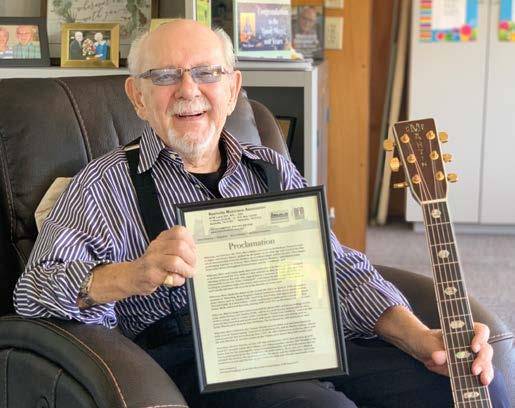
28 THE NASHVILLE MUSICIAN FINAL NOTES continued from page 27
Michael Henderson and Chris Stapleton
Country Music Hall of Fame producer Paul Cohen, who said it would “make him a star.” The tune climbed to No. 8, and became a million-seller. It led to Shiner’s first appearance on the Grand Ole Opry, where he was introduced by Hank Williams. By 1953 Shiner was a regular on the popular WWVA Jamboree program broadcast from Wheeling, West Virginia.
Shiner went on to sign with RCA — his bouncy version of “Mr. Sandman,” released in 1954 included electric guitar work from Chet Atkins. He formed Ly-Ran Publishing in Nashville; one cowrite with Jerry Monday, “We Had All the Good Things Going,” was a hit for Jan Howard, and also recorded by Dolly Parton. He also had cuts with Billie Jo Spears, Parton, Charley Pride and others.
Shiner further expanded his horizons with an appearance in the 1965 movie Second Fiddle to a Steel Guitar with an array of artists that included Merle Kilgore, “Little” Jimmy Dickens, Lefty Frizzell, Kitty Wells, Faron Young, Connie Smith, and Webb Pierce. In the late ‘60s he signed to MGM records, and returned to the charts with “Big Brother” (1967) and “Too Hard to Say I’m Sorry” (1969), two cowritten songs by Jack Clement, who also produced them.
Shiner was the A&R director at the Nashville office of Certron Records in 1970 and 1971.

The label released his version of the Crosby, Stills & Nash pop hit “Teach Your Children,” as well two 1970 albums Life Is Lovin’ What You’re Made For (1970) and Greatest Christmas Kiddie Hits (1970).
Over the years Shiner continued to perform, and also worked as a concert producer. He moved to Florida in the 1970s, and retired in 1997, but continued to perform with his wife Marilyn, as the M&M Duo. In September of 2015, Shiner was honored with a display at the Martin Guitar Museum in Nazareth, Pennsylvania. He celebrated his 100th birthday Feb. 20, 2021, with a festive gala held near his home in Tampa. As a special honor, AFM Local President Dave Pomeroy sent a framed proclamation which detailed the artist’s long career and many milestones. “It’s been a wonderful 100 years,” Shiner said at the celebration.
Shiner was preceded in death by his mother. Survivors include his wife Marilyn; one son, Michael; and three granddaughters.
A memorial service was held Nov. 4 at the First Reformed Church of Tampa. Interment was in the family plot in Bethlehem, Pennsylvania.
“It’s been a wonderful 100 years.” — Merv Shiner


APRIL – JUNE 2024 29 FINAL NOTES Pension Fund Questions? For more information contact: Tanisha Figueroa 212-284-1272 TFigueroa@afmepf.org Gary Lubliner 212-284-1289 glubliner@afmepf.org General Membership Meeting on Zoom/In person Tuesday, May 28, 5:30 p.m. continued on page 30

SYLVIA ROSENZWEIG SAMIS
April 1, 1948 – Sept. 22, 2023
Violinist Sylvia Rosenzweig Samis, 75, died Sept. 22, 2023. She was a life member of the AFM who joined Local 257 Aug. 10, 2016, and was formerly a 40-year member of Local 1 in Cincinnati, Ohio.
She was born April 1, 1948, in Munich, Germany, to Sabina and Isak Rosenzweig. She was drawn to music early in life, and steadily rose in her career, ultimately achieving the position of First Assistant Concertmaster in the Cincinnati Symphony Orchestra.
Family members recounted her warmth, wisdom, and unwavering support. They also spoke of the many ways she honored her late parents, who were Holocaust survivors. Fellow symphony members posted online about her unique contributions to the orchestra. Her stand partner, Eric Bates, said playing with her was “a joy in every way.”
“Every rehearsal and concert we played together was a nurturing master class in musicianship. I am indebted to her, and will always remember our time together, the music, the constant laughter, and partnership,” Bates said.
Survivors include her husband, Charles; one daughter, Urielle; and one son, Michael.
A celebration of life was held Sept. 27 at Congregation Micah in Nashville. A graveside burial service followed at Micah Cemetery, led by Rabbi Flip Rice. Donations may be made in Samis’ name to Puppies Behind Bars, a nonprofit organization that trains incarcerated individuals to raise service dogs.
“Every rehearsal and concert we played together was a nurturing master class in musicianship. I am indebted to her.” — Eric Bates

ANNE WALL CHRISTESON
July 12, 1949 – Oct. 8, 2023
Harpist and educator Anne Wall Christeson, 74, died Oct. 8, 2023. She was a life member of the Nashville Musicians Association who joined Local 257 Aug. 25, 1986.
She was born on July 12, 1949, in Nashville, Tennessee, where she graduated from St. Cecilia Academy as valedictorian. Her musicality developed at an early age; when she was 12 she became principal harpist with the Nashville Symphony Orchestra. She graduated summa cum laude from Vanderbilt University, where she was also honored as a Founder’s Medalist. After her graduation she was awarded with a Woodrow Wilson fellowship to continue her studies, and also received a Guggenheim fellowship. In addition to her work with the NSO, she performed with the Knoxville Symphony and the Knoxville Opera Company as principal.
After her retirement from playing professionally, she began a second career as a teacher of Latin, French, and English at Montgomery Bell Academy. After her passing, many former students lauded her abilities as an instructor in online posts. One of

“My love and fascination for language is a credit to Mrs. Christeson. You could not help but be energized by the joy she had for teaching.”
— John Tully
those students, John Tully, talked about the impact Christeson had on him.
“My love and fascination for language is a credit to Mrs. Christeson. You could not help but be energized by the joy she had for teaching. So much more than an educator, she instilled value and respect into her students. She genuinely cared about how we developed as people. I am grateful to have learned from such an incredible person,” Tully said.
Family and friends remembered Christeson as a country girl who loved Atlanta Braves and Vanderbilt Commodore baseball, and raising horses with her husband at their farm in Leiper’s Fork.
Anne Christeson and Sammye Lee
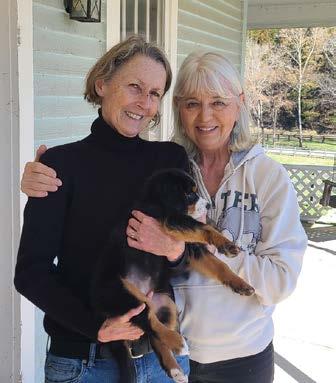
Survivors include her husband Wayne; the extended family of Thomas P. Wall, Jr.; and special friends Edward Gaffney and Margaretta Howe.
30 THE NASHVILLE MUSICIAN
FINAL NOTES continued from page 29

SHOJI TABUCHI
April 16, 1944 – Aug. 11, 2023
Entertainer Shoji Tabuchi, 79, died Aug. 11, 2023. He performed nightly for decades at his theater in Branson, Missiouri, and was a regular guest on the Grand Ole Opry. The violinist and singer was a life member who joined Local 257 April 14, 1987.
He was born April 16, 1944, in Daishōji, Japan, to Shigeru and Yukie (Uchida) Tabuchi, and began playing violin when he was seven using the Suzuki method. As a college student he had a fortuitous meeting with Roy Acuff, who was on tour in Japan at the time. Inspired by Acuff, he began to play bluegrass and country music, and formed a band called The Bluegrass Ramblers. His band won a national contest, and shortly thereafter Tabuchi traveled to the United States with his violin and $500.
Tabuchi first lived in San Francisco, where he met his first wife. He then worked his way across the country, performing in a variety of venues. In Kansas City, Tabuchi played for several years at the Starlite Club. After some time in Louisiana, Tabuchi arrived in Nashville, where he reestablished his connection with Acuff, who booked him for multiple performances on the Grand Ole Opry.
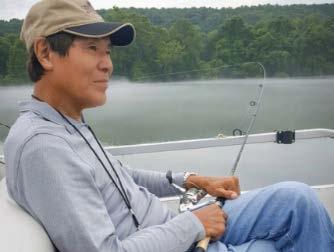
Tabuchi relocated to Branson, Missouri, in 1980. He performed at the Starlite Theatre for several years before opening his own elaborate, 2000-seat theater in Branson in 1990. Tabuchi met and married his second wife, Dorothy Lingo, after his move to Branson, and she would go on to become an important part of the shows, assisting in various aspects of the theater’s productions. He performed twice daily most of the year, in a show that was a perennial favorite with tourists. The versatile musician incorporated many genres into his performances, including polka, gospel, Cajun, Hawaiian, rap, and rock.
Following Tabuchi’s passing, many of his longtime fans expressed their condolences online, speaking of both his popularity as an entertainer as well as his warmth and approachability.
Tabuchi’s discography includes one album from ABC Records, Country Music My Way, released in 1975. He went on to record a dozen additional records on his own label, Shoji Entertainment, and was inducted into the National Fiddler Hall of Fame in 2020.
In addition to his parents, he was preceded in death by one son, Thomas Jason Lingo; and one brother, Mesiah Tabuchi. Survivors include his wife, Dorothy Bailey Tabuchi; son John Tabuchi; one daughter, Chrissy Lingo-Tabuchi; six grandchildren; and one sister, Kazuko Kawano.
Funeral services were held Aug. 20 at Oak Grove Methodist Church in Oak Grove, Louisiana, with Reverends Jimbo Herring and Keigh Murray officiating. Interment was in the Oak Grove Cemetery.
He performed twice daily most of the year, in a show that was a perennial favorite with tourists. The versatile musician incorporated many genres into his performances, including polka, gospel, Cajun, Hawaiian, rap, and rock.
APRIL – JUNE 2024 31
Advertising in TheNashvilleMusician is a cost–effective way to reach professional musicians, high-profile artists and music business executives. WHAT DO VINCE GILL KEITH URBAN TAYLOR SWIFT CHRIS STAPLETON LARRY CARLTON ALISON KRAUSS HAVE IN COMMON? THEY ARE ALL MEMBERS OF THE NASHVILLE MUSICIANS ASSOCIATION AND READ THIS MAGAZINE! TO PLACE YOUR AD, CONTACT LESLIE BARR 615.244.9514 LESLIE@NASHVILLEMUSICIANS.ORG FINAL NOTES
Shoji Tabuchi
Photo by Dan Loftin
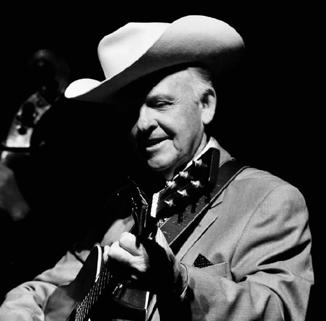
WILLIS SPEARS
Sept. 13, 1940 – Sept. 17, 2023 Bluegrass guitarist and singer Willis Spears, 83, died Sept. 17, 2023. He was a longtime member of the Nashville Grass, and a life member of the Nashville Musicians Association who joined Local 257 May 20, 1981.
Spears was born Sept. 13, 1940, near Summertown, Tennessee, to Paul and Winnie Poag Spears. His interest in bluegrass started when he heard Lester Flatt sing with Bill Monroe on the Grand Ole Opry in 1945. His mother, who also played, bought him a Harmony guitar after seeing his budding interest in music, and by the time he was 12 he had learned the basic chords.
After graduation from Lewis County High School, Spears worked for Murray Manufacturing, but didn’t stop playing mu -
sic. He met Monroe’s banjo player Bruce Weathers, and the two struck up a friendship, jamming together often.
Spears was drafted in 1963, but continued to play with several bluegrass bands while in the service. After his discharge, he returned to work at Murray, but played on the weekends. His band the Cumberland Mountain Trio also recorded one album. Additionally, two of the band’s tunes are included on the 1981 various artist release Wonderful World of Bluegrass Music. At one of the shows the band played, he met Johnny Warren from the Nashville Grass, and once again Spears found a friend who also became a jam partner. At one of these sessions Warren’s band leader Curly Seckler dropped by to hear Spears, and was struck by his vocal resemblance to the late Lester Flatt.
In 1981 Seckler asked Spears to join the Nashville Grass as lead singer and guitarist. “Sometimes folks think I try to sound like the late Lester Flatt, but I’ve never tried to sing like anyone. It’s just the natural way I sound.” In 1987 Seckler made Spears his partner, and changed the band name to Curly Seckler, Willis Spears, and the Nashville Grass. The band played originals as well as bluegrass standards like “If I Should Wander Back Tonight.”
Spears played with the group for its duration; the last official show was in 1994 but there were many reunion gigs that continued through Seckler’s last public performance in 2012, and ultimately a 2013 private get-together at the Bluegrass Hall of Fame and Museum in Owensboro, Kentucky. Seckler and Spears released four albums, and Spears appeared on several other compilations.
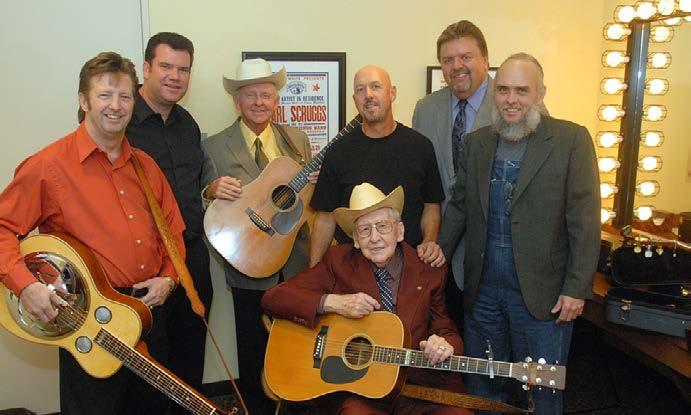
In addition to his parents, Spears was preceded in death by one sister, Margaret Stephens; and six brothers, Frank, Albert, Alvin, Vincent, Lloyd, and Roy Spears.
Survivors include his wife of 59 years, Jane Spears; one daughter, Melissa Staff; one son, Greg Spears; one sister, Vernie Spears; five grandchildren; four great-grandchildren; and several nieces and nephews.
Funeral services were held Sept 21, at Neal Funeral Home in Lawrenceburg, Tennessee, with Jeff Vanlandingham officiating. Interment followed at Barnsville Cemetery in Summertown, Tennessee, with full military honors. Memorials may be made to St. Jude Children’s Research Hospital.
32 THE NASHVILLE MUSICIAN
257
deepest
recently passed away.
Name Born Joined Died Life Member Duane Eddy 04/26/1938 02/11/1986 05/01/2024 Y William L Osment 10/10/1952 02/13/1978 03/05/2024 Y Arthur E Rich 05/14/1965 10/15/2018 02/24/2024 Judy Lee Schreiber 07/24/1934 02/08/1965 03/20/2024 Y Edward J Wilson 05/02/1951 06/03/1976 04/16/2024 Y TNM FINAL NOTES continued from page 31
IN MEMORIAM The officers, staff and members of Local
extend our
sympathies to the families and friends of our members who have
You are in our thoughts, hearts and prayers.
Willis Spears at the Bluegrass Hall Of Fame Museum Owensboro

NEW MEMBERS Jeff Berlin Paul Jonathan Brown James Michael Cargill James Dugal Jason Kimo Forrest Tiffany Freeman James Edward Freytag, Jr Terence McCarthy Fuller, Jr Jesse Allen Grommet Adam Haynes Ryan Jennings Nathan P. Keeterle Steve Porter Leslie Jacob Metz Dee Miller Lawrence Anthony Mitchell Adam Harold Overacker Nicholas W Spicer David James William Taylor Adam James Ward REINSTATED Laurence Moss Aberman Patrick J Alger Benjamin Brent Anderson Andres Filipe Silva Samuel Brinsley Ashworth Rodney A Atkins David Mark Baldwin Joe Bob Barnhill Tucker Russell Beathard Patrick W Bergeson Justin Bertoldie Eric Bikales Nancy A Blake Larry L Borden Jimmy Bowen Casey A Brefka Michael Wayne Britt Nolan Trevor Brown Steve Buckingham Casey James Campbell Larry E Carlton John Carter Cash Brandon Michael Collins Matthew M Combs Jon E Conley James Alexander Cook Mike D Coupe John E Cowan Dorian M. Crozier Dana Eugene Cupp, Jr John Shelby Deaderick Jose Daniel De Assis Donnie William Apple Joseph Michael Dorn Tonya Latish Dunn Joseph L Edwards Mark Lee Fain Robert H Farnsworth Bobby Jean Frost MEMBER STATUS Juan M Garcia Rudy M Gatlin Kevin C. Gatzke John Gavin Gilles Alelard Godard Mark Kevin Grantt Daniel Lenwood Groah Jonathan Shaefer Hamby Michael Wayne Haun Likai He Steve B Herrman Michael Brandon Hicks Daniel Glen Hochhalter Alison F.Gooding Hoffman David Huntsinger Thomas David Hurst Sonya Isaacs James Tyler Jaeger Mark F Johnson Thomas Houston Jones Michael G Joyce Garth E Justice Kieran F Kane Bronwyn Emily Keith-Hynes Donald W Kerce, Jr Timothy William Kreis Kyle Michael Skarshaug Mary Helen Law William Leathers Virginia Lee Carroll Christopher Marsh Lindsey Ryan B Link Wesley Lee Little Michael Lopinto Jacob Lowery Gary Lee Lunn Anthony Edward Cosio-Marron John Leo McAndrew Cheryl Annette McClure Regina McCrary Kevin Y McKendree Yates Walter McKendree James Fletcher Medlin Jacob Metz Mark Andrew Miller John Joseph Mock Stuart F Montez Craig Morrison Keith David Nicholas Jim Ed Norman William M Pennington, Jr Robert C Phillips Stu Phillips Johanna Marcela Pinilla Brent Rader Randy Keech Rainwater Regina Gale Raleigh Matthew Reviere Michael Quentin Rinne Clifford E Robertson Christopher William Rodriguez Giovanni Rodriguez Ed Russell Allen Salmon Esther Sanders Joshua R Schultz Kathy Shepard Stephen Matthew Shutts Byron Slaughter Brian Slayton Craig E Smith Timothy Mark Smith Ty S Smith Thomas A Snider Andrew Michael Sovine Phillip G Stegner Barry Tamburin Brian Keith Thomas George Tidwell Ronald V Townsend Kayla B Wass Willie Weeks Billy Edd Wheeler James Marshall White Dana Keith Williams Dan Edward Williams Kevin Brent Williams Roger D Wills Andrew Whitten Wright Michael Younger EXPELLED Aaron N Apter Rebecca Michele Abrahams William Charles Adkins David Scot Alexander Kate Lyric Allen Timothy Joseph Allen Andrew W Robertson Ashton A Angelle Phil H Arnold Zachariah Phillip Arnold Michael J August Billy Ray Barnette Dean Berner Andres Daniel Blachere Kenneth Edwin Blevins Lee Covington Bogan Cremaine A Booker Brandon Bostic Richard Allen Boyer Emanuel Burks Patrick Dale Burrows Byron M Chambers Charles Randy Smith Terri Lynn Clark David Allan Coe Jared Conrad Wendell Terry Cox Rachel Crick Adrian James Croce Perley Robert Curtis Dan Clark Davis Lance Dary TNM Randall D Davidson Hank De Vito Jessica N Dock Julian Dorio Justin Andrew Eason David Ellingson Charles J. English Steven Frank Farella Mike Feagan Marcus Edward Finnie Jerry Allen Flowers Edward Greene Melody Guy Clayton Charles Hamilton Dawn Bradley Hartley James M Hart, III Shane Michael Harvell Hunter Easton Hayes Jeffrey Todd Hazard Benjamin Keith Helson Kathryn Lynn Hendricks Chip Henderson Richard Conoley Herring Justin Richard Hiltner Jeffrey Thomas Hime Steven Wayne Hines Michael G Hite Sarah Elizabeth Hooker Jedd Michael Hughes Micah Samuel Hulscher David J Humbertson Noah Joseph Hungate Jason Hutcheson Jeffery Don Hyde Kenneth R Janson Bobby Jenkins Burleigh Johnson Calvin Johnson Neal J Johnson Courtney Jimel Johnson Ron Kirby Christian Gabriel Kosmac Harry Clifford Koufman Adam John Kujawa Jonathan Alan Long Pamela Lovelace Luke Aaron Lander Steven A Lupo Randy Lyn McCormick Garrett Keith McReynolds David Mead Glenn Mollette Jordan Morack Heidi Kay Newfield Tony Joseph Obrohta Kenan Kurt Ozan John Pahmer Terry Lee Palmer John Harold Pennell Francis George Perry Daniel Bradley Peter Noam David Pikelny Vernon Pilder Ethan Daniel Pilzer Amanda Pitts Michelle Lynn Poe Kevin M Post Robert P Quallich III Robert A Ragosta April N Richards Andres Felipe Roa Chaunte Ross Lacy Nicole Rostyak Tripper Ryder Thomas John Paul Samulak George Frederick Saunders Micah Todd Schweinsberg Christopher Bennett Sheppard Stephen Louis Shepherd Jose Sibaja Jed Michael Smith Keith E Smith Nathaniel Thomas Smith Tristen C Smith Aaron L Sparling David Aaron Spicher Steven Patrick Ernster James B Stewart David Strayer Kristopher Beau Tackett Jonathan Marc Trebing Michael J Trice Matthew Utterback Thomas Troy Verges Duncan Wachs Randy J Wachtler Marcus Wanner Austin Edward Webb Bryan Shelton White Harvey E Wilson, Jr Jon Scott Wright
DO NOT WORK FOR
The “Do Not Work For” list exists to warn our members, other musicians and the general public about employers who, according to our records, owe players money and/or pension, have failed to sign the AFM signatory documents required to make the appropriate pension contribution, or are soliciting union members to do nonunion work. When you work without the protection of an AFM contract, you are being denied all of your intellectual property rights, as well as pension and health care contributions.
TOP OFFENDERS LIST
Tommy Sims dba Positive Movement
Sims remains in contempt of court judgements from 2012 and 2022. He still owes more than $300K to musicians from a 2008 gospel project. Despite making many promises he has only paid a fraction of his debt, and continues to avoid responsibility.
Nashville Music Scoring/Alan Umstead – solicitation and contracting nonunion scoring sessions for TV, film and video games. Musicians who work for them without an AFM contract are being denied appropriate wages and all intellectual property rights.
Electronic Arts/Steve Schnur – commissioning and promoting nonunion videogame sessions and exploiting musicians' intellectual property for his own gain.
These are employers who owe musicians money and have thus far refused to fulfill their contractual and ethical obligations to Local 257 musicians.
• Terry K. Johnson/ 1720 Entertainment (unpaid contracts/unauthorized sales –Jamie O’Neal project)
• Ed Sampson (producer) & Patrick Sampson (artist) (multiple unpaid contracts/ unauthorized sales) They are making small payments towards this debt.
• Revelator/Gregg Brown (multiple bounced checks/unpaid contracts)
• Beautiful Monkey/JAB Country/Josh Gracin
• Eric Legg & Tracey Legg (multiple unpaid contracts)
• Ray Vega/Casa Vega
• Quarterback/G Force/Doug Anderson
• Rust Records/Ken Cooper (unpaid contracts and pension)
• HonkyTone Records – Debbie Randle (multiple unpaid contracts/pension)
• Mike Barrios (unpaid live performance wages)
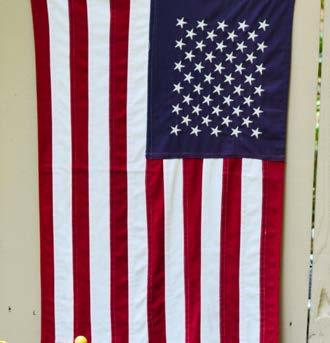
UNPAID CONTRACTS AND PENSION
Knight Brothers/Harold, Dean, Danny & Curtis Knight
River County Band/SVC Entertainment (unpaid demo conversion/pension)
UNPAID PENSION ONLY
Comsource Media/Tommy Holland
Conchita Leeflang/Chris Sevier
Ricky D. Cook
FJH Enterprises
Matthew Flinchum dba Resilient
Jeffrey Green/Cahernzcole House
Randy Hatchett
Missionary Music
Jason Morales (pension/demo signature)
OTB Publishing (pension/demo signature)
Tebey Ottoh
Ride N High Records
Jason Sturgeon Music
AFM NON-SIGNATORY PHONO LIST
We do not have signatory paperwork from the following employers — pension may have been paid in some cases, but cannot be credited to the proper musicians without a signatory agreement in place. If you can provide us with current contact info for these people, we will make sure you get your proper pension contribution for your work.
604 Records
Heaven Productions
Stonebridge Station Entertainment
The Collective
TNM
HOLIDAYS
WE’RE HERE TO HELP
If you have a problem with an employer, whether it’s nonpayment, slow payment, failure to sign a signatory agreement, or another issue — let us know.
34 THE NASHVILLE MUSICIAN
DO NOT WORK FOR
Local 257 General Membership Meeting Tuesday,
2024 5:30 p.m. on Zoom and at Local 257
May 28,
Memorial Day
Independence Day
Monday, May 27 —
Wednesday, June 19 — Juneteenth Thursday and Friday, July 4-5 —










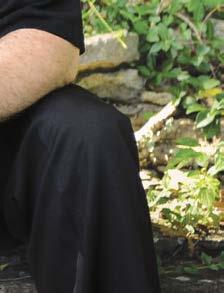

36 THE NASHVILLE MUSICIAN Nashville Musicians Association PO Box 120399 Nashville, TN 37212-0399 —Address Service Requested— Nonprofit U.S. Postage PAID Nashville, TN Permit No. 648 Allow me the honor of serving you in your next Real Estate endeavor, no matter how large or small. § MULTI-MILLION DOLLAR SALES § NASHVILLE REALTOR FOR OVER 10 YEARS § LOCAL 257 MEMBER FOR OVER 30 YEARS Proud Affiliate of The Realty Association MIKE HAYNES REALTOR, e-PRO, ABR, SRES www.NashvilleAbode.com LET’S GET YOU IN A HOME! 615.969.7744 cell | 615.358.9010 office IT’S NOT JUST BUSINESS, IT’S PERSONAL. REAL ESTATE. MHAYNES@REALTRACS.COM













 BY DAVE POMEROY
BY DAVE POMEROY

 BY WILL BARROW
BY WILL BARROW





























 by warren denney
an interview with Larry Cordle
by warren denney
an interview with Larry Cordle

















 BY MELINDA WHITLEY
BY MELINDA WHITLEY



 BY AUSTIN BEALMEAR
BY AUSTIN BEALMEAR


 MICHAEL J. HENDERSON
MICHAEL J. HENDERSON































